#banu qasi triology
Text
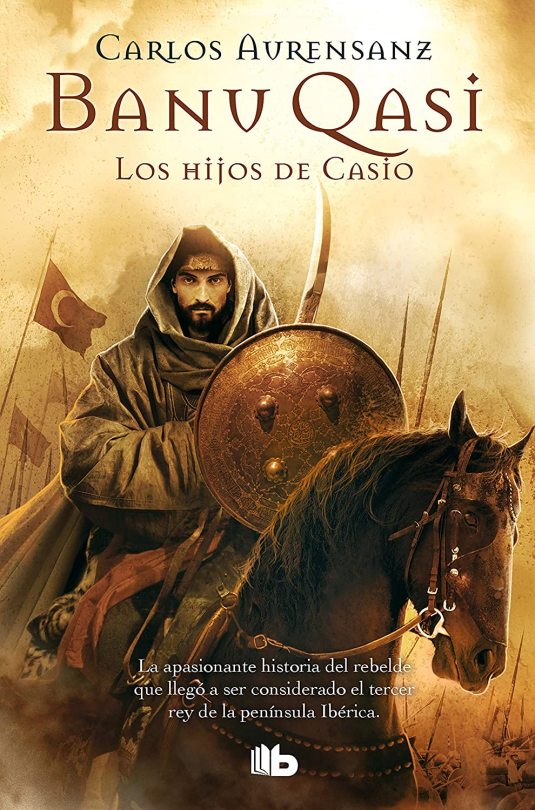
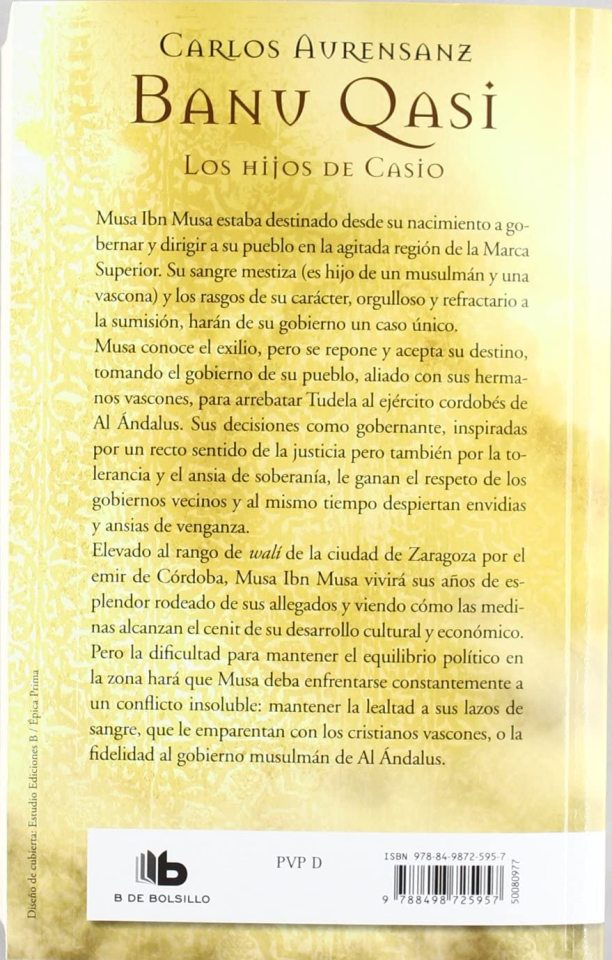
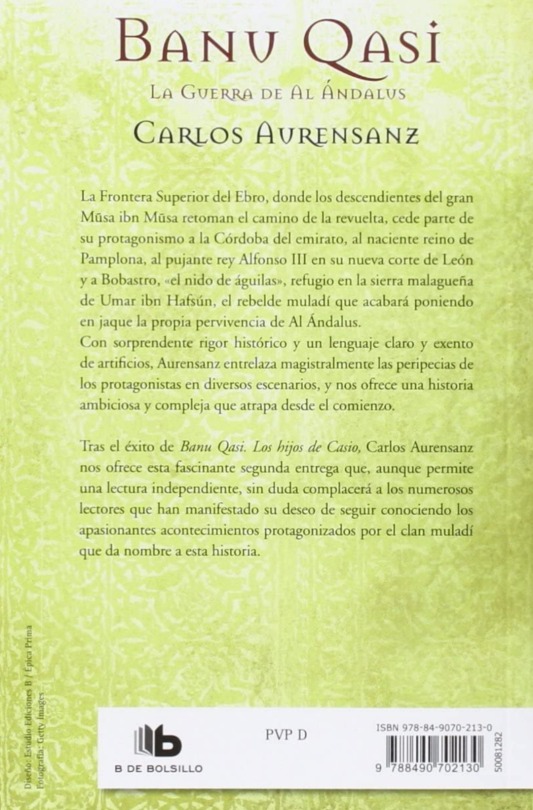
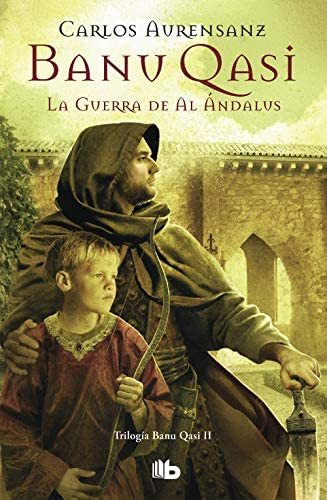

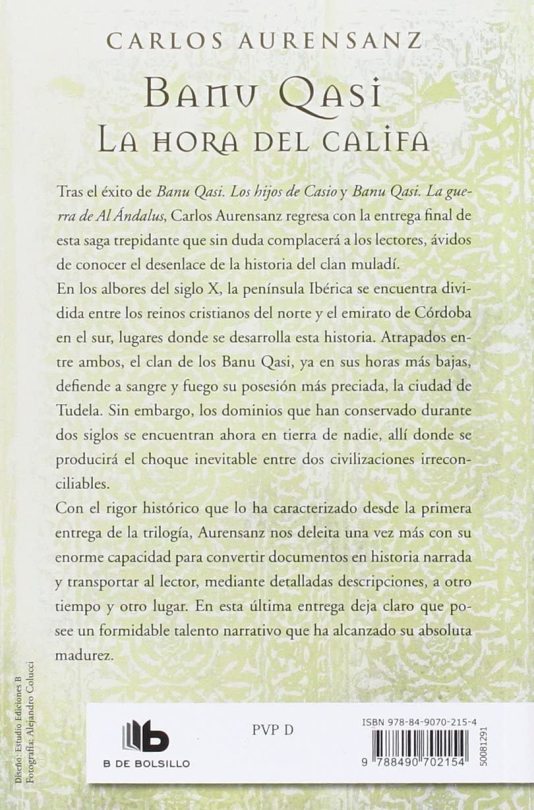
@asongofstarkandtargaryen There's a triology I recently discovered that I want to read. It's the Banu Qasi triology writtenby Carlos Aurensanz, about the Banu Qasi and Iñiga-Aritza/Jimena families and their surroundings. The books can be downloaded on Internet (I have added the links for the download of each on of the books in esch of the titles if anyone wants to read them)
I. Los Hijos de Casio, 2009 (The Children of Casio)
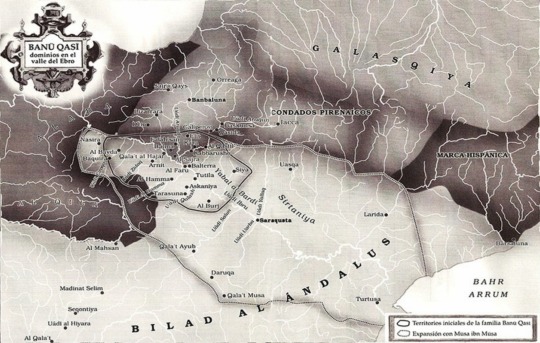
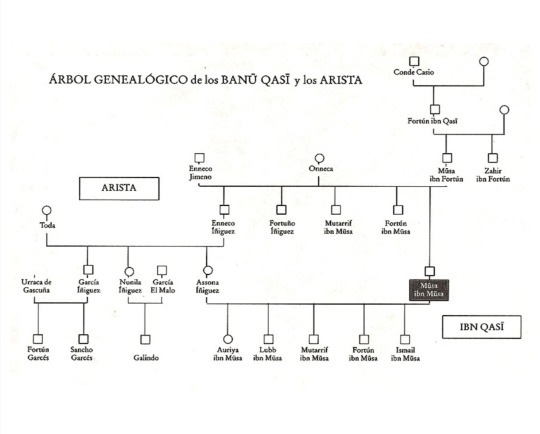
"The exciting story of the rebel who came to be considered the third king of the Iberian Peninsula"
Musa Ibn Musa was destined from birth to rule and lead his people in the troubled region of the Upper March. His mixed blood (he is the son of a Muslim and a Basque woman) and the traits of his character, proud and refractory to submission, will make his government a unique case.
Musa knows exile, but he recovers and accepts his destiny, taking over the government of his people, a consubstantial ally of his Basque brothers, to seize Tudela from the Cordovan army of Al Ándalus. His decisions as ruler, inspired by a correct sense of justice but also by tolerance and a desire for sovereignty, earn him the respect of neighboring governments and at the same time arouse envy and a desire for revenge.
Elevated to the rank of wali of the city of Zaragoza by the Emir of Córdoba, Musa ibn Musa will live out his years of splendor surrounded by his relatives and seeing how the medinas reach their zenith of their cultural and economic development. But the difficulty in maintaining the political balance in the area will mean that Musa must constantly face an insoluble conflict: maintaining loyalty to his blood ties, which related him to the Basque Christians, or loyalty to the Muslim government of Al Ándalus.
Sample: Year 788, 171 of Hegira. Onneca was breathing heavily, clinging to both edges of the wooden bed, while the kabila leaned over her to speak to her in a calm but forceful voice. His hands, hidden under the folds of a rough linen sheet, revealed determined and precise movements: not in vain had the most experienced midwife in the region been notified. Every few minutes, the woman's face contorted in pain, her knuckles turning white as she felt the contractions. The midwife had ordered a table with two basins of clean, hot water and several cloths to be set up next to the bed. She herself had protected herself with an apron that covered her to her feet.
From time to time she inserted her fingers into a cylindrical clay container that contained a dark and oily substance, and continued his maneuvers. Meanwhile, two maids struggled to carry out his orders, trying tohide their fear and nervousness. They had tried to heat the bedroom with two metal braziers that were replaced periodically, but the wind slipped through the thick curtains that blocked the view from the central patio of the house, in the citadel of Arnit. Zahir ibn Fortun waited impatiently. The woman who was about to give birth in the next room was the widow of his brother, who had died three months ago in Saraqusta. Though she tried to put the tragic moment when the news was delivered from her mind, the memory fought to come back, and a familiar feeling of anguish clenched her stomach. His brother, Mūsa ibn Fortún, had been called to Saraqusta to put down the rebellion that had arisen in the city after the accession to the throne of Qurtuba of Emir Hisham I, led by Said al Husayn. Mūsa managed to master thethe revolt after getting rid of the ringleader, and took control of the city, although he had to remain in it to ensure stability. The danger seemed to have been passed, and Saraqusta returned to her calm. But after three weeks, a freedman from the rebel Said assaulted Mūsa as he left the mosque after Friday prayers and pierced his heart with a dagger, without his guard being able to do anything to stop him. At that very moment, Zahir was unable to push away the image of his lifeless brother, because in the next room the last son of Mūsa came into the world, an orphan.
Onneca was a strong woman, like all of her Basque race, originally from the Pyrenean valleys. She had married Mūsa for the second time, after the death of her first husband, the Basque leader Enneco Jimeno, with whom she had had her first two children: Enneco and Fortuño, who were already eighteen and seventeen years old. After Jimeno's death, Onneca moved to Arnit with her new husband, but her children remained in their native valley, to grow up in contact with the town that one day they were destined to lead. Although the separation was painful for Onneca, he was aware of the important role that the men of his lineage had played among the Basques for generations.
Hearing the sounds from the next room, Zahir's thoughts returned to Onneca, widowed for the second time and about to give birth to a son who would never know his father. The voices of the kabila became imperious, confused with the moans of the mother. For a moment there was silence, broken at last by the crying of a child. The midwife had cut the umbilical cord and opened the child's orifices with her fingers. Then she began to wash it, while the mother watched from the bed. The kabila was an experienced woman, and she knew that that blank stare was caused by the exhaustion of childbirth. But in the case of Onneca something else was guessed: a sadness that arose from the depths. The midwife took long strips of linen that she had ordered the maids to cut, and began to wrap the small body, swaddling it until it was practically immobilized. Then she lifted the newborn in her arms and brought him closer to the bed, inviting the mother to take him into her lap. For a moment Onneca seemed not to understand, but finally she reached out her hands and settled the child against her chest. "A precious child, strong, healthy and well formed," said the kabila. "Like his father," Onneca answered with a small voice.
The midwife pretended not to notice the tears that slipped down the mother's face and continued with an animated voice: —Now I'm going to finish you off, we'll clean all this up and let you rest. I have chosen a trustworthy nurse who will be there when you arrive and will take care of the little one.
Onneca nodded slowly and let the woman do it, who took the child again and placed it carefully in a small wicker cradle prepared next to the bed. Finished with her work, she allowed the two maids, calmer now, to take care of removing the bedclothes. "It's the cradle that all my children have used," Onneca said in a whisper to the girls, outlining a smile. Zahir jumped to his feet as the door to the next room opened. He had no experience as a father, because his only marriage had not been blessed with the arrival of children. His wife had died years ago, and he hadn't taken another, so the birth he'd just attended was the closest thing to parenthood he'd ever experienced. The midwife, who was leaving the house, informed her: it had been a boy, and both mother and son were fine. He turned his head in the direction of the Qibla and gave thanks to Allah. "The mother wants to see you, and I must say goodbye." Do not hesitate to send a message if any setback arises. "We won't hesitate," he replied, at the same time he deposited a small leather bag in her hand. We appreciate the work you have done. Zahir entered the bedroom, and looked at his brother's wife, who opened her eyes when she felt his presence. The man approached the bed, and Onneca took his hand. "He is a child, whole and healthy," she announced. "I know, Onneca. At least this has gone according to your wishes. Onneca nodded gently, though her eyes had blundered again. "Now that the child is here, you must put into practice everything we have planned together." My children…” “Rest now,” Zahir interrupted. Time will have to take care of that when you recover. "Just one thing: I've thought about the name I'm going to give the child." His name will be Mūsa, like his father: Mūsa, son of Mūsa. “Sounds good, Mūsa ibn Mūsa…” “You know? I have a good feeling,” he confided. I'm sure he's going to do great things. It's not easy for me to explain it, but it's as if a star had gone out in our lives and with it another one lit up. Zahir agreed withwith a smile and, sitting on the edge of the bed, he squeezed the woman's hand until he noticed that her breathing became regular and slow. Then he got up carefully and left the bedroom.
He entered the room where Mutarrif was waiting and found the boy sitting on the stone bench near the fire, his eyes lost in the flames that heated the room. Noticing his uncle's presence, he gave him a questioning look, but managed to hold his ground in an effort to hide the uneasiness he felt. Zahir saw the worry in his too-bright eyes and smiled reassuringly before speaking, “Everything went well, Mutarrif. You have a new brother... a boy. Your mother is well, although very tired. The boy nodded and smiled but remained silent. His uncle sat next to him. On the bench on the opposite wall, little Fortún was sleeping soundly, judging by his regular breathing. The two brothers usually slept there, on light mattresses stuffed with straw that served as seats during the day. "Your mother is resting now, but tomorrow you can see both of them." -Thank you. Zahir leaned forward to rest her elbows on her knees, her hands cupping her face as she suppressed a slight yawn. The day had been long and exhausting. "Mutarrif," he said, sitting up, "I want you to know that I've been talking to your mother...The last few months have been very hard on you and your siblings, I know. Your father's death has affected all of us greatly. He paused to take a deep breath, calculating how to continue, "You are fourteen now, Mutarrif, almost a man, and now we must face the future." Allah Almighty has allowed the death of my brother, but in his mercy he has only wanted it to happen when you and Fortún are not children anymore. The boy made a gesture that indicated that this did not comfort him too much. “I have promised your mother,” Zahir continued, “that I will take care of you as long as it is necessary. Not only in terms of your maintenance, which we have secured due to the position we occupy, Allah be praised! What should concern us the most from now on is your training. As I know my brother had in mind, you must devote all your effort to study and training in the military. My father had already discussed it with me.
He wanted me to start accompanying him on some of his expeditions. He just had to wait until he was fifteen. Zahir noted the effort the boy was making to keep his voice steady. 'Yes, I suppose so, Mutarrif. However, we will have to modify those plans somewhat. I know your taste for the militia, and I have arranged with the officers of the garrison your transfer to their dependencies. You will live with them while you are introduced to the use of weapons and military arts. For a moment Mutarrif's face lit up. "But you must not neglect your learning at the mosque school with the other boys your age." I don't mean to scare you, but the imām is ready to work hard for you,” he said in a nonchalant tone, trying to break the tension. "I have to learn to ride well." My father said that to be a good army general you have to know how to handle weapons on horseback. "Ah, I think I can help you with that, it's my specialty," he replied briskly. This time Mutarrif looked at his uncle and smiled slightly. A moment later they had melted into an embrace. "Don't worry, boy… it's going to be all right," Zahir managed to say. We are going to understand each other.
Year 799, 183 of Hijra. The instability in Saraqusta continued after the death of Mūsa ibn Fortún. Revolts and attempts to seize power by different Arab factions followed one another, and the emir of Qurtuba, Hisham I, was forced to send his armies to quell the riots in what was considered the most important square in Uādi Ibru.
However, Saraqusta was not the only problem that kept Emir Hisham I busy. Since his accession to the Cordovan throne, he had had to face rebellions within Al Ándalus itself, in addition to successive campaigns against the northern border territories. His father, Abd al Rahman I, the first Emir of Qurtuba, had had three sons, but had not appointed his eldest son, Sulayman, to succeed him, but rather the second son, Hisham. At the time of the emir's death, Hisham, who was in Marida, hurried back to Qurtuba to take possession of the throne, but when Sulayman heard of his brother's proclamation, he rose up in arms and set out to conquer. of Qurtuba. The third brother, Abd Allah, who had not welcomed Hisham's elevation to the emirate, joined the eldest. Thus, one of the emir's first tasks was to fight for the throne against his two brothers. He had to mobilize the army to repel Sulayman's attack and encircle Tulaytula. After a year of conflict, the two brothers offered submission to Hisham and, after receiving from him seventy thousand gold dinars, went into exile in the Maghreb. The support given by the Banū Qasī family to the emir in Saraqusta, which had cost Mūsa ibn Fortún his life, was not forgotten. Mutarrif had just turned twenty-one when he was summoned to the capital by the governor of the march. Since his father's death, the boy, along with his brother Fortún, had dedicated every minute of their time preparing to assume the leadership of the family that would one day correspond to him, under the control and support of his uncle Zahir. When Mutarrif set out from Arnit in the direction of Saraqusta, following the route that skirted the river, little did he know the reason for the call. Eighty years ago, when the Muslims reached the lands of the Ibru under the command of Tariq, they were under the rule of Mutarrif's great-grandfather, the Visigothic count Casio, who did not hesitate to sign a pact with the newcomers and become the caliph's maula of Damascus. But the leaders of Banbaluna, as in many other Visigothic cities, opted for a different relationship: they maintained their control of the area in exchange for an annual tribute for the Qurtuba coffers. Non-payment of said tribute was a frequent reason for the emir's armed intervention, as had happened precisely in Banbaluna, which was under the control of the Baskunish, whose leaders dominated the area of the western Pyrenees.
A new attempt to break away from the commitment had forced the governor of the March to intervene, and to guarantee the continuity in the payment of the tribute, he decided to leave a wālī at the head of the garrison representing the power of Qurtuba. The interview at Saraqusta was brief, for the governor was not a man of many words. He exchanged proper greetings with Mutarrif and praised his father's role. Precisely in recognition of this role of the Banū Qasī, he said, he had decided to call the young muladí to his presence: he would be the new worth of Banbaluna. He had to move to the city without wasting time and assume his new duties. After being informed by a high official of the details of the situation in the land of the Basques, and after receiving the appropriate instructions, Mutarrif left Saraqusta at the head of a large entourage. Since then, four years had passed in which things had changed a lot for the Banū Qasī.
After Mutarrif's departure, Fortún had grown into a strong and proud young man who had managed to earn the respect and consideration of his comrades in arms in the Arnit garrison. Gradually, he had seen how all the inhabitants of the area recognized his condition as a natural leader, just as it had happened with his father and before with his grandfather. Mutarrif had been at the helm of the Banbaluna government for a year when news of Hisham I's untimely death arrived in Qurtuba, who had been succeeded to the throne by his son Al Hakam I, who was only twenty-six years old. Since Mutarrif arrived in the city, relations had been strengthened with his brothers on the mother's side, Enneco and Fortuño, who were still on their lands in the Pyrenean valley of Salazar, two days away.
On several occasions Zahir had accompanied Onneca there to visit her older children. Little Mūsa traveled enthusiastically, eager to see his stepbrothers again, for whom he professed boundless admiration. During the first years of Mūsa's life, the stays in Isaba, where Enneco had his residence, were rather short, and they were limited to the summer season, when the good weather allowed the boy to enjoy playing in the green and endless meadows, bathe in the icy waters of the river, scare the sheep and milk the cows. However, over the years, the visits were prolonged, and Mūsa began to spend some time in the care of his brothers, especially the eldest son, who was amused by the little one's bright and spontaneous character and allowed him to share some of his memories with him. activities. During those summers, Enneco became the father Mūsa had never known. There were also many occasions when Fortún, from Arnit, went to visit his brother Mutarrif in Banbaluna. Zahir attended these interviews with satisfaction, and felt proud of these two young people in their early twenties who, perhaps forced by circumstances, acted with a maturity almost beyond their age. In such meetings they dealt with the political situation in the area, mainly in Saraqusta, where instability once again reigned. But the situation was not calm in Banbaluna either: a large group of Pamploneses, led by Balask al Yalaski, opposed the emir's authority over the city, and some attempts at confrontation had arisen. News reached Mutarrif that Balask and his followers were in favor of establishing relations with Charlemagne, the Carolingian monarch whose vast territory extended beyond the Pyrenees. The two brothers knew that the leadership role of their family in the lands of Uādi Ibru, after the hiatus imposed by the death of their father, would sooner or later lead them to intervene in the events that were taking place in the March, mainly in Saraqusta.
For this reason, according to Zahir, both decided to leave Arnit and move with the bulk of the military garrison to Tutila, located a shorter distance from Saraqusta and better communicated. Tutila was then a small town located at the confluence of the Uādi Qalash with the Uādi Ibru, at the foot of an elevation crowned by a modest defensive fortress. The existence of a bridge over the mighty riverbed made the enclave a strategic point in communications throughout the valley. Many of its inhabitants still recounted to the younger ones the passage through the city, twenty years ago, of the imposing army of Charlemagne on his return from Saraqusta, on the way to Roncesvalles.
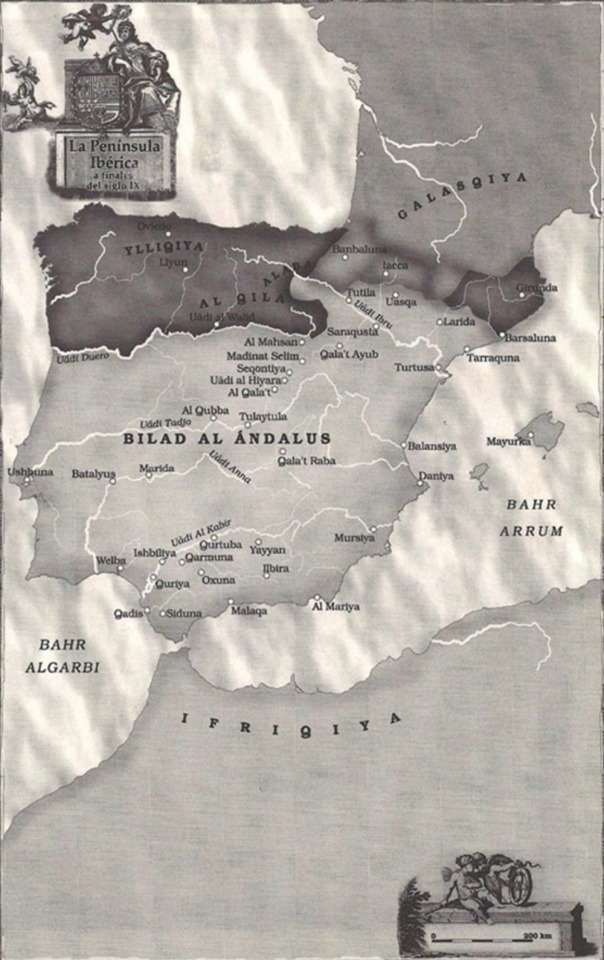
II. La Guerra de Al Ándalus, 2013 (The War of Al Andalus)
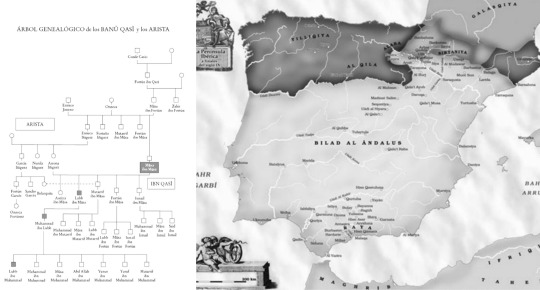
The Upper Border of the Ebro, where the descendants of the great Mūsa ibn Mūsa resumed the path of revolt, ceded part of its leadership to the emirate's Córdoba, the nascent kingdom of Pamplona, the mighty King Alfonso III in his new court in León and Bobastro, "the eagle's nest", refuge in the Malaga mountains of Umar ibn Hafsún, the muladí rebel who would end up jeopardizing the very survival of Al Ándalus. With surprising historical rigor and clear language free of artifice, Aurensanz masterfully intertwines the adventures of the protagonists in this diversity of settings, and offers an ambitious and complex story that will once again captivate the reader.
Fascinating second part of the saga already started with Banu Qasi: Los hijos de Casio that takes up the narration of the events carried out by the muladí clan that gives its name to this story.
Sample: Year 863, Hegira 249, Qurtuba. Sunset was undoubtedly the time of day that Onneca preferred. Although this was the third summer that she would spend in the capital, she had not managed to get used to the intense heat of the Córdoba summer and, if he missed something from his native land, there in the north, in Basque lands, it was the sunny but cool days of the mountains, which allowed him to maintain activity even during the hottest hours of midday. Not so in Qurtuba, of course. When the sun reached its zenith, both she and Fortún, her father, used to already find themselves sheltering in their comfortable rooms in the Dar al Rahn, the magnificent building destined to house the numerous political hostages of the emirate. The House of Hostages occupied a privileged space between the aljama mosque and the wall that separated the madinat from Uādi al Kabir. The main access to the building was next to the Puerta del Puente, a place of continuous movement of people and merchandise that delighted the young Onneca. At fifteen, she was a jovial and alert girl, in her father's opinion perhaps too much for a society like that, in which women had perfectly defined limits that they should not cross. The first weeks of his stay in Qurtuba had been hard: he still kept on his retina the images of the destruction of Pampilona and all the Basque villages that Muhammad I's army had had devastated in its path. She remembered her anxiety during the negotiation in which Fortún had to agree to be transferred to the capital as a hostage, and how she threw herself at her father's feet to beg him to take her with him. Those images returned to her again and again wrapped in a cloud of unreality, which lasted in the three interminable weeks that they used to cross the entire territory of Al Ándalus from north to south. Three years. Only three years, but for Onneca it seemed like an entire existence had passed. In Qurtuba she had discovered a completely new way of life, of which she had only had references through the stories of her Muslim relatives from the Ebro. But then she was a girl, and for her all those stories of emirs and concubines, lavish palaces and enormous mosques they did not differ at all from the rest of the stories they used to hear during the cold nights in old Pampilona, comforted by the warmth of the fire.
Their treatment from day one had come as a surprise to both her father and her. Even during their transfer, they had been provided with unthinkable comforts in the rear of a huge army such as that of Muhammad I. It is true that the haymah they occupied during short nightly rests was permanently guarded by four members of the emir's personal guard, but the The mounts they rode on were excellent, the food they were offered was more than dignified, and they did not lack a pitcher of fresh water while they crossed the endless plains of the center of the Peninsula.
With her mother dead, the separation from her father, whom she adored, would have been unbearable. Having him by her side, being able to accompany him during his captivity, had made her feel strangely lucky from the start. The House of Hostages was a spacious and well-preserved two-story building whose rooms opened onto a patio that even had a singing fountain in the center. Fortún and Onneca occupied a lodging made up of three rooms attached to the southern wall, a location that allowed it to receive the first rays of the morning sun and kept it in the shade during the hot hours of the afternoon. The girl was one of the few women who lived in the building, whose inhabitants were mostly men, younger than old, belonging mostly to part to lineages of high birth.
Despite the diversity of origins and religions, the captivity had established strong bonds of friendship between them, and they had adopted the lively Basque as the daughter or sister that everyone would have wanted by their side. From the beginning, Onneca had worked hard to make her father's life as easy as possible. He would get up at dawn, to devote the coolest hours of the day to domestic chores that might involve some effort, and before the sun warmed they would go out together to the nearby market, where they would be greeted by the familiar bustle that so pleased him. At that early hour, the stalls were overflowing with merchandise from the nearby orchards and farms, and soon the basket that hung from her arm contained what was necessary to supply the small pantry. In In recent months, the person in charge of carrying that load had been Abdel.
In the first interview they had with the chamberlain, they were offered the possibility of having one or two slaves to attend to their needs, and Fortún was grateful and willing to accept the proposal. As soon as they were alone, however, Onneca made another suggestion to her father. She would take care of the simple household chores, and in return Fortún would ask for something on the quarterdeck. Ever since she learned her fate, Onneca had decided not to waste time during her captivity, and the first goal she set for herself was to speak the Arabic language correctly. Although it was true that he already knew its rudiments, thanks to contact with his relatives and with the many Muslim merchants who visited Pampilona, he did not intend to miss the opportunity offered by his forced stay in that splendid city, the capital of the emirate. But he needed someone with enough knowledge at his side.
Abdel entered the Dar al Rahn only two weeks after Onneca's arrival. He was a seventeen-year-old boy, tall, thin, and dark-haired, whose gaze barely lifted from the ground, and whose company became habitual since he introduced himself to both of them with a low voice. Every day, in the hottest hours, Fortún retired to his bedroom, and it was not surprising that he fell asleep hearing his daughter repeat old Arabic sentences over and over again, occasionally corrected by the masculine voice of her young teacher. Little by little, his visits became more frequent and extended to the central hours of the morning. With a studied gesture of surprise, He would pretend to bump into Onneca in the market, offer to carry her basket, and accompany her to the House of Hostages. Once there, they both looked for any excuse to prolong the meeting, and with Fortún's acquiescence, the boy ended up accompanying them in their frugal lunch, before beginning the daily lessons. In the middle of the afternoon, after a brief rest, Fortún would return to make an appearance in the spacious room, and then Abdel would get up and with a slight bow he would say goodbye to both of them. That was the moment when Fortún, taking advantage of the shadow of the buildings and without ceasing to admire the superb southern wall of the main mosque, used to cross the square in the direction of the fortress.
He had discovered what for him it constituted the greatest treasure in the palace of Muhammad, a treasure of which he had already had complete news through the abbot of Leyre, there in the distant foothills of the Pyrenees: the magnificent library of the fortress housed thousands of volumes, and a part nothing insignificant of these was translated into Latin. It had not cost him any effort to obtain the necessary permits to access its premises, and in those years he had established a relationship of frank friendship with the senior official to whom the emir personally delegated his authority as responsible for the conservation and expansion of that center of knowing. Although the hours for Fortún passed quickly there, his desire to enjoy his daughter's company did not diminish, so he soon began to borrow scrolls and volumes with which to fill his time without having to leave the Dar al Rahn. His Christian faith had taken root firmly under the influence of both his father and the Bishop of Pampilona, Willesindo, confessor and friend of the family, so his first readings had been directed to the works of the fathers of the Church, who with great surprise had found in those immense shelves. There he had discovered De civitate Dei, by Agustín of Hipona, and had even had the opportunity to enjoy some of the twenty volumes of the Etymologies of the old bishop of Ishbiliya, Isidoro. The deep meditations of the old masters were a balm for him, as they somehow compensated for the impossibility of practicing worship in the city's churches, something that the sovereign had prohibited at the beginning of his reign, after the serious events carried out by christian martyrs who, led by Bishop Eulogio, had defied the religious laws of the emirate until they ended up executed. That afternoon at the end of summer, in the middle of the month of Rajab, the city was abuzz with rumors, as the return of the victorious Cordovan army, under the command of Prince Abd al Rahman, was imminent. Apparently, Alaba's campaign against King Ordoño of Asturias had been a real success. No inhabitant of Qurtuba expected anything different, since, last spring, they had seen with their own eyes the enormous display of men from all the groups of southern Al Ándalus who had gathered on foot and on horseback on the esplanade of the musara, ready to leave. The narrators who walked the streets and squares of Qurtuba spared no praise for a sovereign that had led them to a new victory against the infidels of the north: twenty Christian counts had bitten the dust according to the stories that circulated by word of mouth, and King Ordoño's own brother had been killed during the battle. Onneca had expressed concern about the fate of her relatives, but Fortún was able to reassure her after confirming in the fortress that on this occasion the people of Pamplona had not taken part in the conflict. Undoubtedly the vanguard of the army was approaching the city, for the Bab al Qantara, the nearest gate to the river, was wide open, and a high-ranking procession from the quarterdeck was heading towards it flanked by the crowd, there was also expectation in the Dar al Rahn.
The men were preparing to leave, and Onneca, after trying to glimpse something of what was happening outside above their shoulders and heads, headed determinedly to her lodging, where she found Fortún devoted to reading a heavy volume. "Father, the army is coming!" They are already coming out to receive them. Fortún looked up and regarded the girl with a slight smile. "Ah, youth…" he said with a sigh. You want to go out and you want me to come with you…” “Perhaps it won't be necessary, Father. Abdel can do it, he's still by the door, I can see him from here. Fortun studied the pages before him. - Be it, my daughter. However, you must not go far from the building. And be back before nightfall. Onneca's face lit up, she kissed her father on the cheek and left the room, hiding her hair under a light scarf. He ran across the courtyard, not giving much thought to the decorum that a girl of her position was supposed to hold, she slipped through the people grouped under the lintel of the gate and, once outside, looked around for Abdel. He did not find it immediately, since the boy did not count on his presence and had tried to approach the entourage, but due to his height his head stood out above the rest. Onneca managed to almost push his way through, and laughed heartily at the shocked face of the young man as he stood beside him. "Onneca!" You should have warned me! It's not safe for a girl…” “Shhh! he snapped. Who are they? he asked, his eyes fixed on the two superb horsemen approaching from the opposite end of the esplanade. “They are the sons of Muhammad. The first is the crown prince, Al Mundhir. The one who advances behind the guard is Abd Allah.
No doubt they are going to receive their brother Prince Abd al Rahman right here, who is returning to lead the troops. —How can they be brothers being so different? Al Mundhir is dark and has curly hair, but look at Abd Allah: his skin is fair, his hair is blond... and those blue eyes. 'Both are sons of the emir, but certainly conceived by different wives. I understand they were born the same year. But Abd Allah is much more like his father. "How many children does Muhammad have?" Onneka asked. —At least twenty males and fifteen females... But look at their clothes, and their mounts... they are magnificent! "Let's get closer," Onneca said as she tried to push through, curious. The crowd barely allowed us to walk. Whole families went to the streets to see the heirs to the throne up close, a spectacle that was not repeated often. Onneca advanced sideways and, at the cost of enduring some complaints, made a place for herself in the front row, next to a woman with a young child who was looking at the procession with astonished eyes. Al Mundhir was passing in front of them, and Onneca took in his face, beautiful but pockmarked. He also observed that a dog was running naturally among the riders, as if wanting to take part in the party. The boy also saw it and separated from his mother to approach him, but the animal backed away in fear, until it was just a few elbows from Abd Allah's horse, which was waving to the crowd gathered on the sides. Onneca sensed the danger immediately. The mount reared, raising its front legs into the air.
The mother gave a warning cry, but it was Onneca who rushed towards the little boy, took his arm and, with a jerk that landed both on the ground, prevented the horse's hooves from crushing his body at the last moment. tiny. When the boy was already cared for by his mother and Abdel was advancing towards her, the girl looked up and discovered that the prince was trying to control his mount without taking his blue eyes from her face. The scarf that covered her head had fallen off, and she suddenly felt exposed to all eyes. Unable to control the situation, he pushed through the crowd and disappeared in the direction of the Hostage House. Abdel tried to follow her, but a voice behind him stopped him. -You! Do you know the girl? asked Abd Allah gravely. Abdel stopped and adjusted his posture to address the prince respectfully. “I know her, my lord. It is the daughter of one of your guests, Fortún, heir to the kingdom of Banbaluna. He is staying with his father at the Dar al Rahn, and I myself have been assigned to improve his knowledge of our language. The prince narrowed his eyes and seemed to smile. He waved the boy away with one hand, so Abdel, with a slight nod, stepped back to follow Onneca's steps. He had to report on the conversation he had just had. When a footman from the keep entered the Dar al Rahn's quarters the next morning with a scroll in his hand, Fortune took it with a trembling hand. He was sure he knew its contents.
III. La Hora del Califa, 2015 (The hour of the khalifa)
At the dawn of the 10th century, the Iberian Peninsula was divided between the Christian kingdoms in the north and the emirate of Córdoba in the south, places where this story takes place. Caught between the two, the Banu Qasī clan, already in low hours, defends with blood and fire their most precious possession, the city of Tudela. However, the domains they have held for two centuries now find themselves in no man's land, where the inevitable clash between two irreconcilable civilizations will take place. With the historical rigor that has characterized him since the first installment of the trilogy, Aurensanz delights us once again with his enormous ability to turn documents into a narrated story and transport the reader, through detailed descriptions, to another time and another place. In this latest installment, he makes it clear that he has a formidable narrative talent that seems to have reached its absolute maturity.
Sample: The emir remained standing in the middle of the silence, broken only by the whistling of the wind through the branches and the screeches of the birds of prey that flew over the cliffs, until he looked back at his son and, with a gesture, asked him to it will come closer. “Remember while you live this moment, Al Hakam. The road to get here is drenched in the blood of tens of thousands of good believers. Fifty years and the tenacity of four emirs have been necessary to break the resistance of this nest of perdition. When I was born, the Umayyad state as you have known it, the same one that seems so immutable to you now, was about to give up under the pressure of the rebels who had their refuge in this place. You know, because I have told you, that the chief who governed in Burbaster came to set fire with his projectiles in the aljama mosque of Qurtuba. The efforts of many men have been necessary so that you and I can tread these paths. Open your eyes and ears wide, because the stories you are going to hear and what you are going to experience in these days are the foundations on which we have to build the future of our dynasty. Today is the first day, listen to me carefully, of a new era for the Umayyads. A day that has taken longer to arrive than the person responsible for all this could ever suppose
Characters II Locations II Words & Etymologies
#banu qasi#books#banu qasi triology#los hijos de casio#la guerra de al ándalus#la hora del califa#carlos aurensanz#long post#historical fiction
6 notes
·
View notes
Text
Banu Qasi triology: Locations (+ Maps extracted from the book and modern reconstruction of plans of some cities of that period of time I found on Internet)
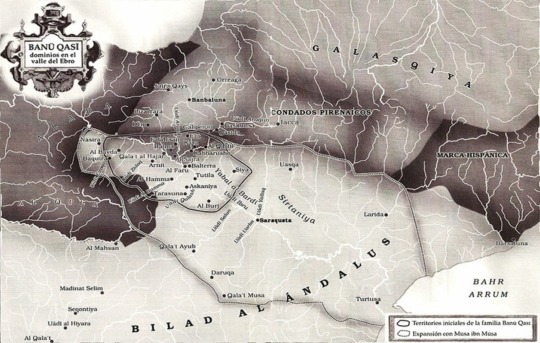


(* Some towns and cities that already existed are not in this maps, but probably were not included in the maps because maybe they're not relevant for the story, X, X, X )
Zaragoza (×) (although this one represents the Zaragoza from 11th century, due to the presence of the Palace of Aljaferia (×), although a watchtower existed since 9-10th centuries in that place, the Troubadour's Tower, that currently forms part of the palace)
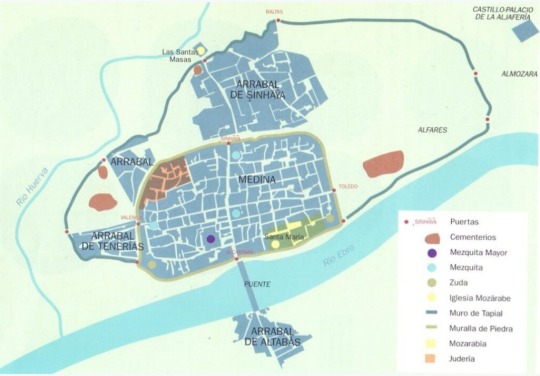
Tudela, but here's a video of Pamplona/Iruña
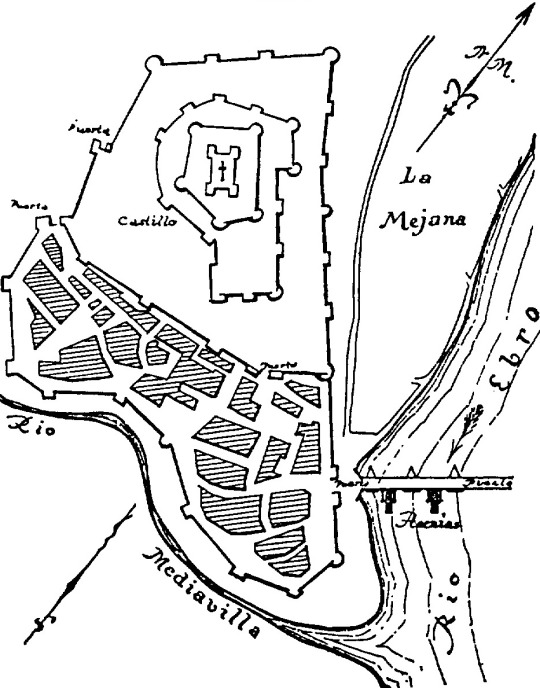
Córdoba (Here's a video with the current-day Alcázar and the Caliphal baths)
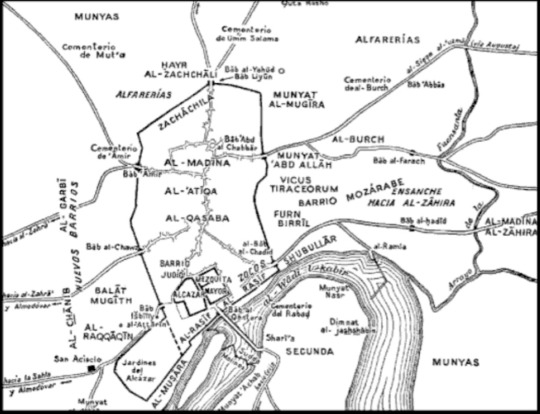
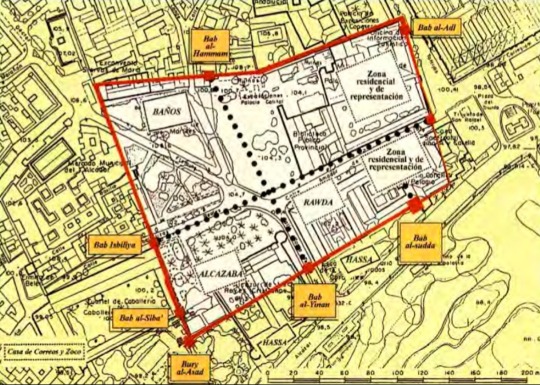

Toledo
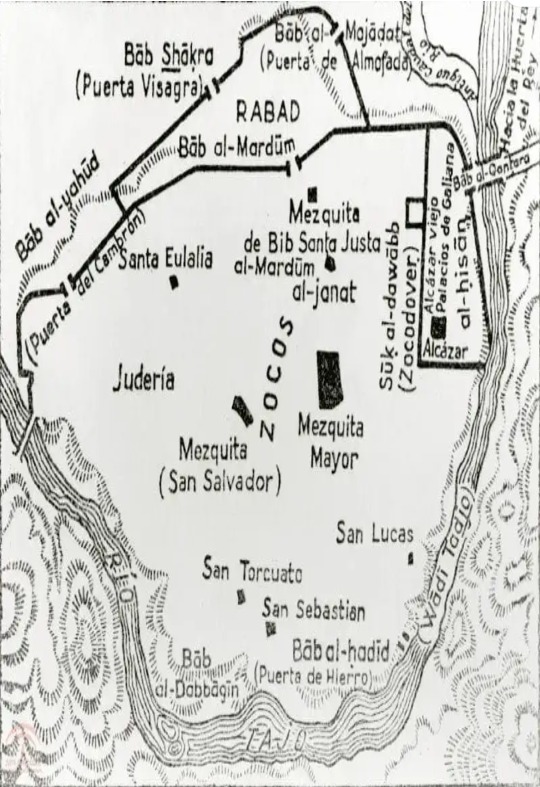
Alaba: Álava
Al Bayda, Albayda: Albelda
Al Burj: Borja
Al Busherat: Las Alpujarras
Al Faru: Alfaro
Al Garb: 'the west', Algarve
Al Hamma: Alhama
Al Hamma: site that corresponds to the current Baños de Fitero
Al Hamra: 'the red', the Alhambra of Granada
Al Lura: Álora
Al Maghrib: current Maghreb area, Morocco, Algeria and Mauritania
Al Mahdiyya: capital of the Fatimid Caliphate founded by Al Mahdi
Al Mariya: Almería
Al Mahsan: Almazán
Al Mudawar: Almudévar
Al Munastir: Almonacid
Al Qala't: Alcalá de Henares
Al Qāhira: Cairo
Al Qastil: Carcastillo or Murillo el Fruto
Al Qila: Castile
Al Qulaiya: Alcolea
Al Qubba: Talavera
Al Rawda: one of the interior gardens of the alcazar of Córdoba, where most of the emirs were buried
Al Sarqiyya: Axarquía, in Granada
Al Xaraf: Aljarafe
Al Jazira: Algeciras
Almunya de Aisha: Muniesa
Al Sajra: Azagra
Antaqira: Antequera
Arnit: Arnedo
Aryiduna: Archidona
Askaniya: Cascante
Asturqa: Astorga
Asnad:Cenes
Astīban: fortress located in the current-day Alhambra
Aura: Fortress next to Barcelona, possibly in present-day Valldaura
Aybar: Aibar
Bab al Qantara: the Bridge Gate, in Córdoba, also known as Bab as-Sudda or the Azud Gate
Baghdad: capital of the Abbasid emirate
Bagúh: Priego
Bahr Algarbí: Atlantic Ocean
Bahr Arrum: Mediterranean sea
Balaga: Balager
Balma: place located on the left bank of the Ebro river next to Calahorra, it may correspond to the town of San Adrián
Balansiya: Valencia
Balterra: Valtierra
Bambaluna: Pampiluna, Pamplona
Banu Basir: Benameji
Baquira: Viguera
Barbitaniya: región of Sobrarbe, that included Jaca, Barbastro and Boltaña
Barsaluna: Barcelona
Baskunsa: place name that would correspond to the fortress of Rocaforte, which after the Reconquest, it would give to the current Sangüesa, located at the foot of this valley
Batalyus: Badajoz
Barbastur: Barbastro
Bayanna: Baena
Bayāna: Pechina, important trading city of the Mediterranean sea, replaced by the port of Almería
Basta: Baza
Bilad al Ándalus: Hispania
Bulāy: Poley, Aguilar de la Frontera
Burbaster: Bobastro, Umar ibn Hafsún's shelter
Cantabria: mountain range that borders river Ebro by the north, next to Logroño
Castro Muros: San Esteban de Gormaz
Dar al Islam: the lands of Islam
Dar al Rahn: the House of Hostages, in Córdoba
Daniya: Denia
Daruqa: Daroca
Deio: Monjardín
Dus Amantis: the Rock of the Lovers
Falah'san: Falces
Fās: Fez, capital of the Idrisi emirate
Finyāna: Fiñans
Galaskiya: Land of the galaskiyun, the gascons
Galipenzo: Gallipienzo
Garnata: Granada
Girunda: Girona
Hardaris: Ardales
Hisn Asar: Iznájar
Hisn Qámara: castle of uncertain location, near Colmenar and Casabermeja, in the province of Málaga
Hisn Qastuluna: the ancient Roman city Cástulo, in Jaén
Iacca: Jaca
Ifriqiya: Tunisia
Ilbira: Elvira, next to Granada, capital of the distrit with the same name.
Isbāniyā: Christian chroniclers called the peninsula as a whole Hispania. For the Arabs, Al Ándalus is only the land dominated by Islam. They call the Christian land by the name of their kingdoms, and the term Isbāniyā is reserved for the entire peninsula, although it is rarely used.
Ishbiliya: Sevilla
Istiba: Estepa
Istiya: Écija
Kabbaruso: Caparroso
Kara: Santacara
Larida: Lleida
Ledena: Liédena
Leqant: Fuente de Cantos
Liyun: León
Lizarrara: Estella-Lizarra
Madinat Selim: Medinaceli
Madinat al Faray: Guadalajara
Malaqa: Málaga
Mārida: Mérida
Martus: Martos
Milīla: Melilla
Millas: Mijas
Muish: Muez
Munt Sun: Monzón
Munt Liyūn: Monteleón
Mursiya: Murcia, also known as Tudmir (this name comes from the Visigothic count Teodomiro, who ruled it by the time the Muslims arrived to the Peninsula)
Nasira: Nájera
Niebla: District that corresponds to the current-day province of Huelva
Orreaga: mountains of Ibañeta or Roncesvalles
Ossa: Huesa del Común
Qabra: Cabra
Qabtil: Isla Menor (Sevilla)
Qadis: Cádiz
Qala't al Hajar/Qalahurra: Calahorra
Qala't al Hans: Alange
Qala't Gazuan: Alcalá de Guadaira
Qala't Ayub: Calatayud
Qala't Musa: Calamocha
Qala't Rabah: Calatrava
Qarmuna: Carmona
Qarqar: Cárcar
Qasida: Cáseda
Qarcastil: Carcastillo
Qasr Bunayra: Casarabonela
Qayrawán: Kairuán, capital of Ifriqiya, current-day Tunis
Quluniya: Clunia
Qumaris: Comares
Quriya: Coria del Río
Qurtuba: Córdoba
Qustantaniyeh: Constantinople
Qutanda: Cutanda
Raya: district that corresponds to the province of Málaga
Rasif: A promenade in Córdoba that ran along the right bank of the Guadalquivir river
Resa: fortress located on the banks of the Ebro, near the mouth of the river Arga
River Eiroca: River Iregua
River Iberus*: River Ebro
*the Iberian peninsula takes its name from the river Iberus/Ibero, the river Ebro
Rumiya: Rome
Sabta: Ceuta
Salubāniya: Salobreña
Santabariyya: Santaver, Muslim district that corresponds to the province of Cuenca
Saqunda: village in the suburb of Córdoba, on the left bank of the Guadalquivir river
Sajra Qays: Qays rock, fortress located near the current-day town of Huarte Araquil, in the Rock of Echauri, northwest of Pamplona
Saraqusta: Zaragoza
Seqontiya: Sigüenza
Siduna: Medina Sidonia
Sirtaniya: La Cerretania, in the Aragonese area of the Pyrenees, around the valleys of the Gállego and Cinca rivers. This denomination disappears from the sources from the 10th century, when the County of Aragon appears
Siya: Ejea de los Caballeros
Suhayl: Fuengirola
Sumuntān: Somontín
Tahert: city in the north of Africa, in Algeria
Tahust: Tauste
Takurunna: one of the corias of Al Andalus, with capital in Ronda
Tarraquna: Tarragona
Talyayra: fortress located below Bobastro, over the Guadalhorce river.
Tarasuna: Tarazona
Tāy^ula: Tíjola
Tulaytula: Toledo
Turtusa: Tortosa
Tutila: Tudela
Uādi al Hamma: River Alhama
Uādi al Hiyara: Guadalajara. At first, the name of rhe city was Madinat al Faray, but later it adopted the old name of the river Henares
Uādi al Jurs: River Guadalhorce
Uādi al Kabir: River Guadalquivir, 'the big river'
Uādi al Walid: Valladolid
Uādi Anna: River Guadiana
Uādi Aragun: River Aragon
Uādi Aruad: River Arga
Uādi Cinqa: River Cinca
Uādi Duwiro: River Duero
Uādi Eyroqa: River Iregua
Uādi Ibru: river Ebro, and by extension, the Ebro valley. (Also known as Uādi Abro or Uādi Ibro)
Uādi 'Ís: Guádix
Uādi Nahar: River Henares
Uādi Qalash: River Queiles
Uādi Salit: River Guadacelete
Uādi Salún: River Jalón
Uādi Sanyil: River Genil
Uādi Tadjo: River Tajo
Uādi Uarba: River Huerva
Uādi Urbiqo: River Órbigo
Uādi Yallaq: River Gállego
Uādi Zidaq: River Cidacos
Uakhshama: Osma
Uasqa: Huesca
Ubbada: Úbeda
Uksunuba: Faro (Portugal)
Ulit: Olite
Uriyuwala: Orihuela
Ushbuna: Lisboa
Vareia: Varea
Welba: Huelva
Yabal al Bardi: Las Bardenas Reales, in Navarra
Yabal Sulayr: the mountains of the Sun, Sierra Nevada
Yabal Tariq: 'the mountain of Tariq', Gibraltar
Yayán: Jaén
Yilliqiya: Asturias (and by extension, Galicia). It's also writen as Illiqiya or Gilliqiya.
Yussana: Lucena
Etymology II Characters
2 notes
·
View notes
Text
Banu Qasi triology: Words & Etymology
'amil: local chief. Plural: 'ummāl
'amil al-bahr: 'almirante', admiral
'arif: low ranking officer
'arif al bannā: master builder
albannā: 'albañil', construction worker
albáytar: 'albéitar', precursor of the current veterinarian
al'ard: 'alarde', pre-departure ceremony for a military campaign
albardí: esparto-like plant
(This plants are either called atocha, esparto or albardín)
alfaquí: priests and teachers, specialized in religious subjects, both in terms of their teaching and their application
algara: revolt
alhabáqa: 'albahaca', basil
alhínna: 'alheña', henna, dye used for its magical and cosmetic properties. It is used to dye the hair and to beautify the hands and feet.
almuwádan: 'almuhédano', muezzin, person in charge of the call to prayer in the mosques
alqabála: business transaction tax
alqasába: 'alcazaba', fortress
alqásr: 'alcázar'
alqáyid: 'alcaide', warden
alqaysaríyya: 'alcaicería', area of the market reserved for the most valuable objects
al-quitrān: 'alquitrán', tar
al jurs:" the mute", elite guard corps of the successive emirs
alkuhl: alcohol
almúnya: country house used as an occasional residence, located in a cool area, with an abundance of water and vegetation
alqutún: 'algodón', cotton
amān: amman, pardon in exchange for laying down arms, capitulation treaty
as sayyida: the Lady, referring to the emir's first wife
asaifa, sa'ifa: the 'aceifas' were expeditions of the Cordovan army against Christian areas that took place during the summer period, at times almost annually. In many cases it was the emir himself or some of his sons who led them
asfarag: 'esparragos', asparagus
ashsharín: 'aserraderos', sawyers
assánya: 'aceña, noria'
assutáyah: 'azotea', rooftop
assúd: 'azud', weir, prey
attahúnna: 'tahona', bakery, bread oven
azza'farán: 'azafrán', saffron
bābūs: 'babuchas', light shoe without heel
bait al mal: religious community treasure, amount of money, destined to the relief of the most needy and the payment of the expenses derived from the operation of the mosques
baraka: luck, blessing
baskiya: name of the Arabic sources of the Basque language, incomprehensible jargon for them, which is why it is classified as "barbaric language"
baskunish: basques
bilawar: ornaments made from stringed beads, origin of the Spanish word 'abalorio", bead
burj*: tower
*the name of town of Borja in Aragon comes from that word, also the male name Borja and the surname Borja, the noble family of the Borjas probably were from that town, and when they moved to Italy, their surname was adapted as Borgia (in other post I wrote that Teruel comes from Tirwal, meaning tower, because in some sites that etimology I read that it comes from Arabic, although the Arabic word for tower is burj, so maybe Tirwal is a kind of Arabized form of the latin word for tower, turrem/turris, like Guadalupe means River of wolves because the lubb in Wadi al-lubb comes from an Arabized form of the latin word lup)
comes: count, highest representative of the Mozarabs in a city, in charge of collecting their taxes
dā'is: Fatimid missionaries in charge of spreading the Shiite doctrine
dar al raha'in: hostage house
*(the word 'rehén', hostage, comes from the Arabic raha'in)
dar al sina'a: 'dársena', dock
dimmī: member of Christian or Jewish minorities subject to Islam
dinar: gold coin used during the emirate
dirhem: silver coin used during the emirate
dīwān: set of offices grouped within the alcázar that made up the central administration
drakaar: dragon
fals: low value copper coin
falūkah: shallow draft sailing boat to go up rivers
faquí: 'alfaquí', alphaqui, doctor or scholar of the law
fata: slave, eunuch
fitna: revolution, civil war
fityán: page
funduq*: warehouse where merchants deposited their stocks and their place of accommodation. Origin of the Spanish word 'alhóndiga'.
*or al fundaq, that derived as alfóndiga in old Castilian, and then to alhóndiga
galasqiyin: gascons
gallasa: a woman in charge of the female area of the public baths
ghasul: Clay made with cloves, lavender and rose petals to beautify hair
gūrab: "crow", warship similar to the galley, with a highly variable number of oars. Plural: girbān
hadra: capital of the kūrah or province
hammam: arabic bath
haram: main prayer hall of the mosque
harem: 'harén'
harrāqā: warship supplied with naphtha
hasīs: 'hachis', hashish, the consumption of opium in Al Ándalus is attested from the 10th century, due to the appearance of remains of bowls to consume it.
hachib: position of maximum responsibility in the court of the Cordovan emirs, direct head of central administration, military and provincial
haffarín: laborers, diggers
haymah: 'jaima', tent, usually made of camel skin
hisba: market admission and regulation treaty
hisn: castle, fortress. Plural husun
Id al Adhà: lamb feast, one of the main celebrations in the Muslim calendar, which falls on the tenth day of Dul Hijjah
imām: 'imán', imam, spiritual or religious head of a Muslim community
jarayaira: prostitute who worked in a brothel or dur al jaray
jassa: group made up of the aristocracy, the dominant families of society and the main dignitaries of the government and the army
jatam: Royal seal
jayyarín: 'caleros'
jizya: burdensome tax that non-Muslims from Al Ándalus had to pay
jund: troops of Syrian origin who participated in the early days of the Arab conquest. Plural: junud
katib: senior civil position in the Cordoba administration
khalífa: 'califa', caliph
kuhl: kohl, powder made with antimony, toasted olive and date pits, and cloves, which beautifies the eyes and highlights the look
kunya: nickname used in Arabic onomastics
kūrah: 'cora', kora, each of the emirate's administrative divisions, similar to a province or district
madinat: 'Medina', city
mahalla: military camp
maqbara: graveyard
maqsura: enclosed space inside the mosque of Córdoba that improves the security and privacy of the emir
mawla: client, person linked to another by a client relationship. Plural: mawali
maylis: literary gatherings
mayûs: also madchüs or machüs, Normans, Vikings. Arab chroniclers also use the names alurdumâniyûn or nordumâni
mihrāb: niche located in the wall of the mosque facing the Qibla and in the direction of Mecca
minbar: kind of pulpit, usually made of precious wood and ivory, where the preacher would sit to deliver the sermon in the mosque
muhandis: construction technician, engineer
muladí: descendant of those inhabitants of the peninsula who, after the arrival of the Arabs, spontaneously submitted and embraced the Muslim religion. They constituted the majority group of the population together with the Mozarabs (from Arabic mustarib: arabized), who maintained the practice of Christianity, subject only to the payment of special tributes (jizya).
muqrif: 'matarife'
musalla: outdoor enclosure in many Muslim cities, facing Mecca, which served as an open-air oratory
musara: 'almozara", open and wide space outside the cities in which equestrian exercises, horse races, demonstrations and military parades were held
muwalladun: muladíes
muwassaha: 'moaxaja', Arabic poetic or musical composition
muzdamin: civil head of the Jewish aljama (the rabbi was the religious leader)
nabarrus: It seems probable that since the 8th century the users of the nabar or plowshare in Old Basque were known as nabarrus in the Pamplona region, that is, the peasant population
nāfta: incendiary material used in naval warfare
naggafat: mistresses of ceremony
najjarín: carpenters
naqib: commander of a two hundred-man battalion in the emirate army
na'úra: noria
nazir: head of an eight-man squad in the emirate army
neggacha: specialized woman to compliment the bride in the ritual prior to Muslim weddings
pasaranga: itinerary measure equivalent to 5250 meters used by the Persians since ancient times
politeístas: term commonly used in Arab chronicles to refer to Christians, alluding to the conception of God as three different people
qa'id: commander of a thousand-man battalion in the emirate army
qabila: Muslim midwife
qādī: Muslim judge *(other form of this word is alqádi, that derived into 'alcalde', mayor in Spanish)
qafiz: Arab unit of measurement of variable value according to the area and the time
qamís: front buttoned garment
qarāqir: 'carracas', argosy, merchant ships
qasí: belonging to the Banu Qasi clan
qass: storyteller. On market days it was common for mubahrich (puppeteers), la'ib (presdigitators), muhli (minstrels), hasib (fortune tellers)
qubba: Royal pantheon that served as accommodation for the Emir of Córdoba during the expeditions
*(al qubba is the origin of the word 'alcoba', meaning bedroom or bedchamber)
qumis: Arabized denomination of the old Christian Comes, head of the Mozarabic community in each city, in charge of relations with the Muslim authority and especially the collection of taxes
qurtubí: relating to Cordoba
ra'is: Captain of boats, in charge of navigation, while the qa'id holds the military command
sabat: elevated walkway over the street that linked the alcazar with the mosque of Cordoba, for the exclusive passage of the emir
sabun: 'jabón', soap. In Muslim Spain, a rudimentary soap made from olive oil and wood ash was used.
sahib*: Lord, formula of respect before a superior
* or sayyid, from which the name of Cid comes from.
sahib al 'ard: quartermaster general, in charge of reviewing ('ard) the weapons and equipment. From the Arabic term al'ard comes the Spanish 'alarde' *(and the verb alardear, both meaning something like to boast, to brag)
sahib al abniyā: master mason
sahib al madina: city prefect
sahib al suq: head of the souk, later he would become the muhtasib or almotacen, an official in charge of ensuring compliance with Islamic norms, and specifically for the proper development of commercial transactions in the souk
sahib al surta: Police chief
salat: there were five calls to prayer, salat al fajr, or also called salat al subh (dawn prayer); salat al zuhr (at the instant the sun begins to decline); salat al 'asr (mid-afternoon prayer); salat al maghrib (a few minutes after sunset) and salat al 'asa or salat al'atama (one hour after sunset)
salaqiba: slaves from Slavic countries, of great importance during the emirate of Córdoba
samra: night party, evening party, sarao, origin of the Spanish term 'zambra'
sāwna: warship similar to galley. Plural: sāwani
sarauil: breeches or 'zaragüelles'
shari'a: Islamic law
shura: Islamic assembly
siqlab: plural of salaqiba
sirtaniyyun: Cerretans, Aragonese
suak: walnut bark
sudda: prey
suq: 'zoco', market, souk
tābiya: construction technique, formwork
tafaya: dish made with slow-cooked coriander broth, pepper, onion, oil and water, to which meatballs and crushed almonds are then added
tahlil: small leather box in which Muslim soldiers used to carry relics, prayers and exclamations of profession of faith
tiraz: workshops controlled by the emir in which fabrics considered luxury items are made
ulema: doctor of Islamic law
umm walad: concubine mother of one of the emir's sons
wālī: 'valí', governor of a province or part of it
wazīr: 'visir', vizier
yabal: mountain
yamur: top of the minaret formed by golden spheres of decreasing size
yenun: evil genies
yihad: Holy war
yilliqiyun: denomination that the Arab chroniclers give to the Asturians
zakat: taxes that Muslim families had to pay in Al Ándalus
zakat al suq: market rights
zandaqa: crime of heresy
zanáti: Origin of the Spanish word 'jinete*', rider
* I made a post some time ago about history, etimology of this word and genets (and an Asoiaf related drawing about a silly idea I thought)
Locations II Characters
1 note
·
View note
Text
Characters of the Banu Qasi triology (+ some familiy trees of the Banu Qasi, the emirs and khalifas of Cordoba, the Arista & Jimena dinasties and the Asturian/Leonese kings)
Banu Qasi-Arista Familiy trees from the books:
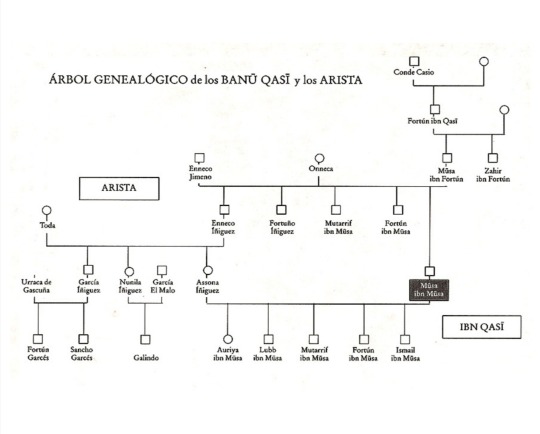
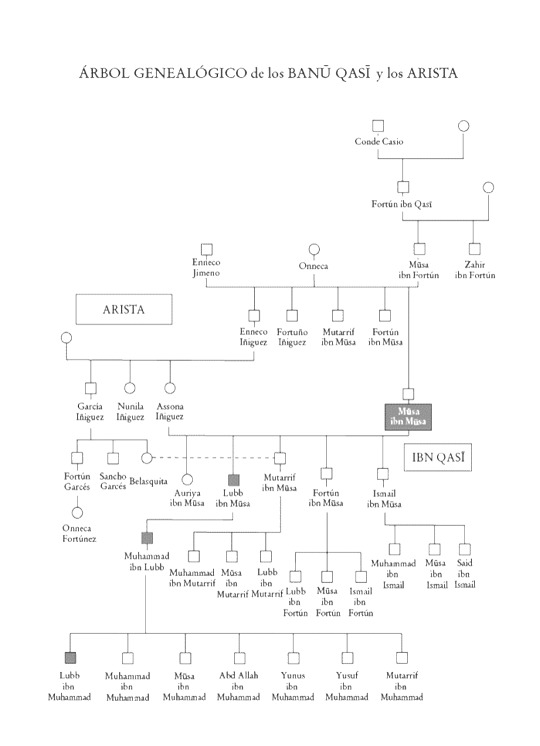
Arista-Jimena & Benu Qasi dinasties family trees I found on Internet:
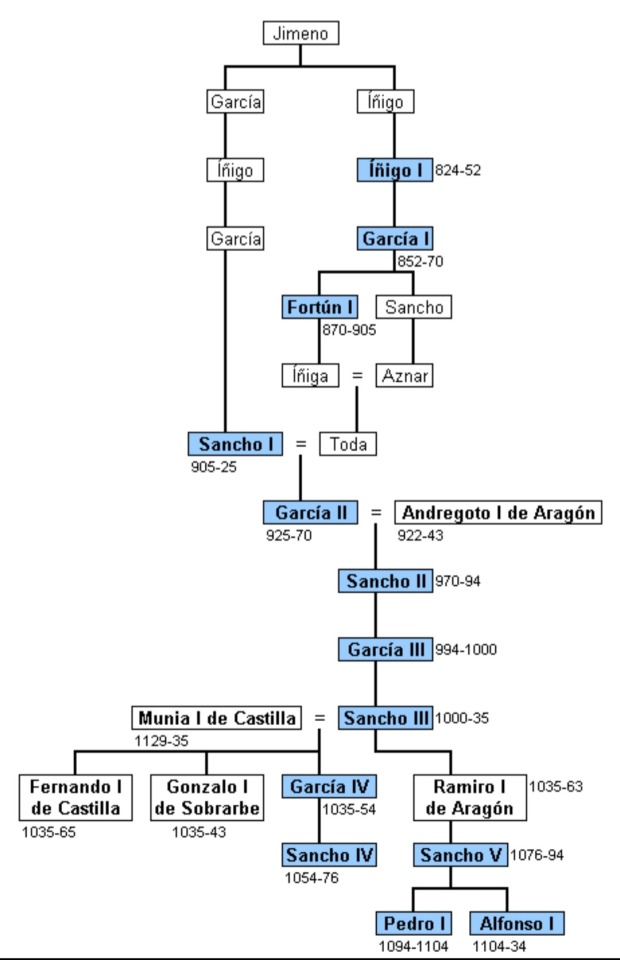
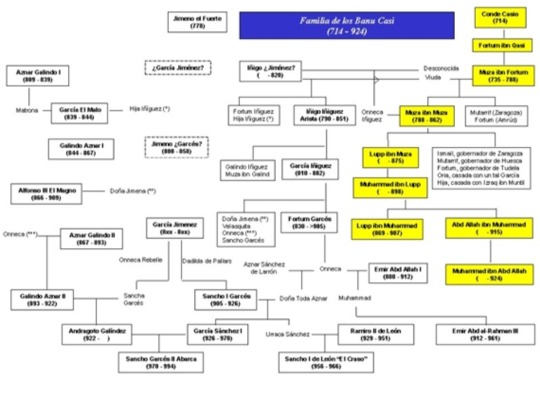
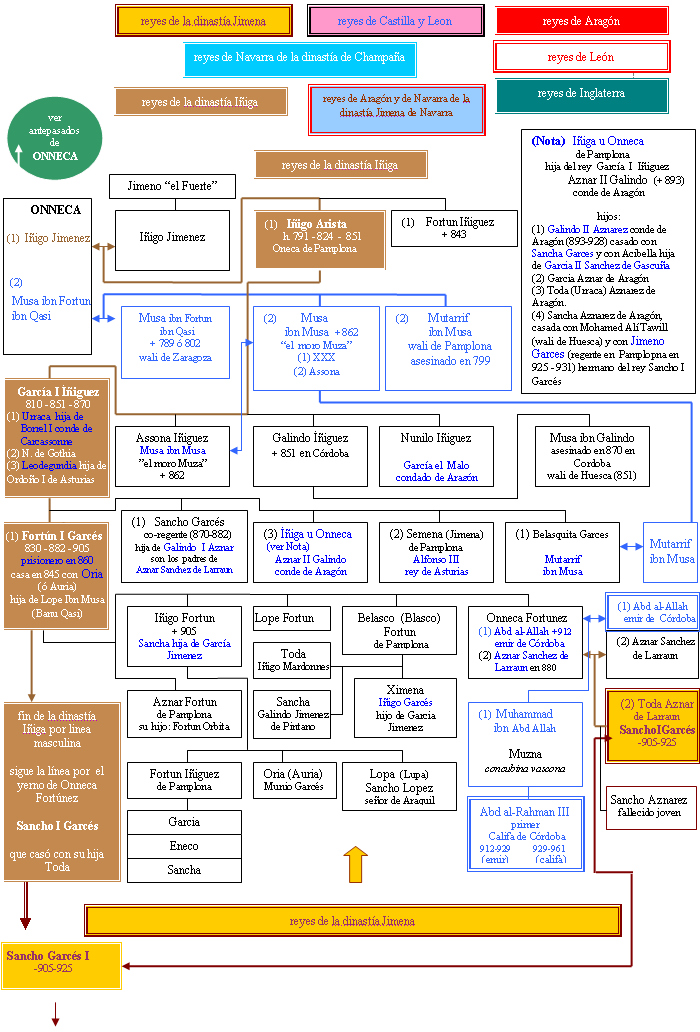
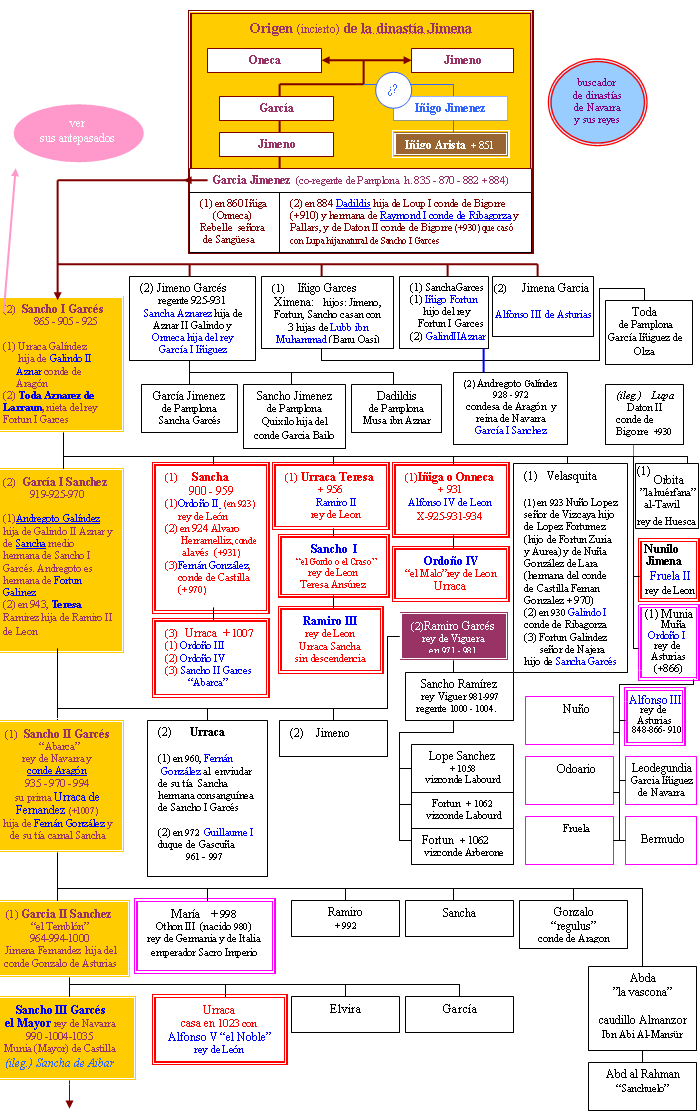
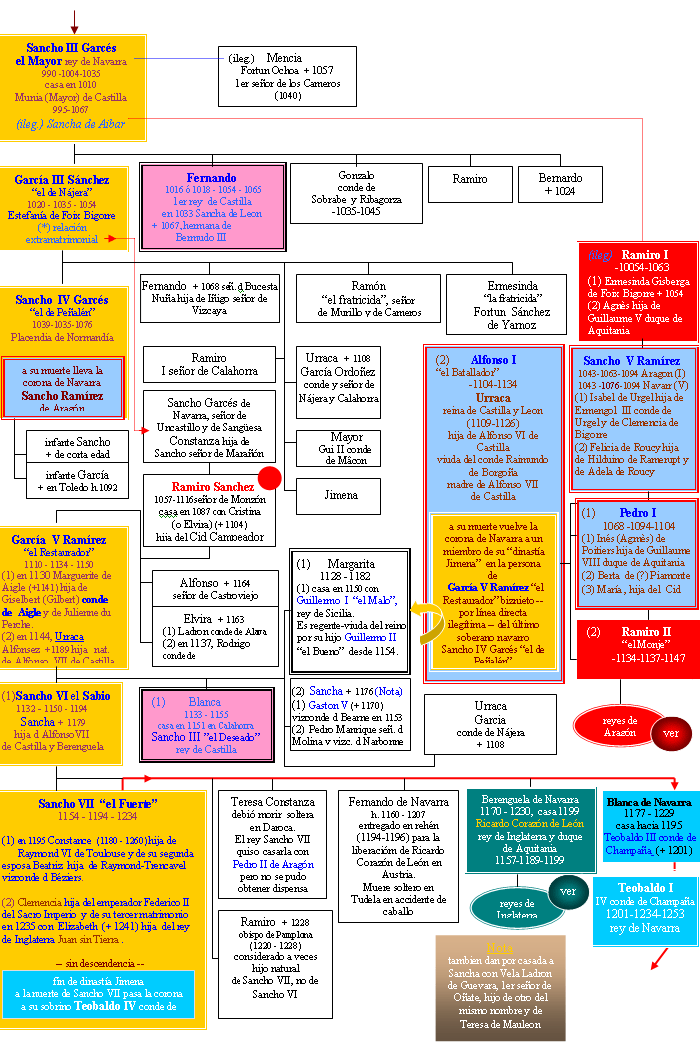
The Asturian-Leonese kings:
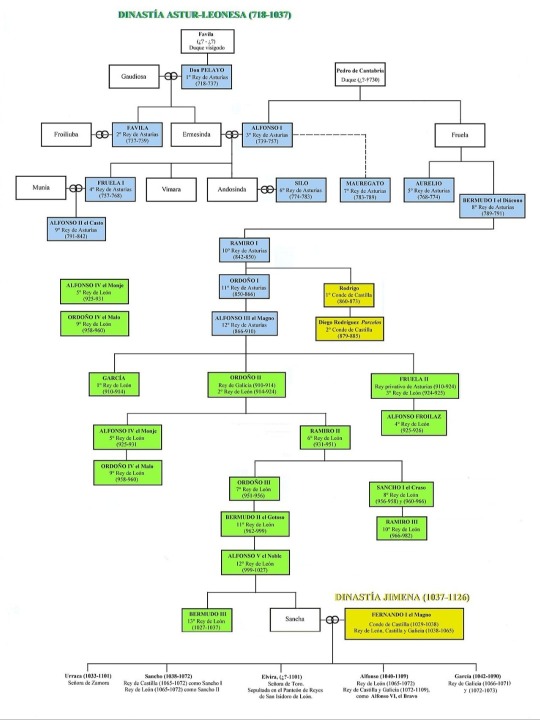
The Umayyad emirs and khalifas of Cordoba (the first ones are the Umayyads from Damascus, the Umayyads from Cordoba start with Abd al Rahman I):
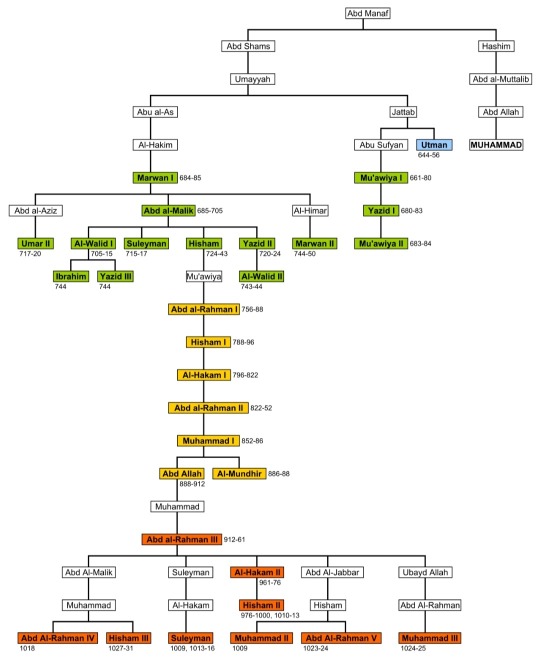
Abulfath Nasr: Eunuch who achieved great influence and power in the court of Abd al Rahman II.
Abd al Karim ibn Mugit: Hayib of Al Hakam I, a prestigious general and trusted man of the emir.
Abban ibn Abd Allah: Son of the emir Abd Allah
Abbas ibn Abd al Aziz: Cordovan General.
Abbas ibn Abd al Barr: Governor of Huesca
Abd al Aziz al Tuchibí: Patriarch of the Tuchibíes
Abd al Aziz: Male son of the emir Abd al Rahman III and his wife Maryam.
Abd al Malik: Eldest son of Al Tawil.
Abd al Rahman I: First Emir of Córdoba (756-788), granson of the khalifa Hisham of Damascus. He was the only survivor of the slaughter of the Umayyads of Damascus carried out by the Abbasids and their supporters. The Abbasids established their caliphate in Baghdad, and Abd al Rahman fled to Al Ándalus and established an independent emirate from Baghdad, the emirate of Cordoba.
Abd al Rahman ibn Marwan: Rebel of the heart of Merida
Abd al Rahman ibn Badr: Son of the hachib Badr ibn Ahmad.
Abd al Rahman ibn Ibrahim ibn Hayay: Son of Ibrahim ibn Hayay, little king of Ishbiliya.
Abd al Rahman ibn Umar: Son of Umar ibn Hafsun.
Abd al Rahman II: Fourth Emir of Córdoba (822-852).
Abd al Rahman III: Eighth emir of Córdoba, son of Muhammad ibn Abd Allah. He succeeded his grandfather after his father's death.
Abd Allah ibn Kulayb: General and Governor with Abd al Rahman II
Abd Allah ibn Yahya: Governor of Zaragoza with Muhammad I
Abd Allah ibn Muhammad: Seventh Emir of Córdoba (888-912), husband of Onneca and father of Muhammad.
Abd Allah ibn Muhammad: Second son of Muhammad ibn Lubb, leader of the Banū Qasī since 907.
Abd Allah ibn Hayay: Arab rebel from Seville
Abd Allah ibn Khalaf: Vali of Barbastro and father-in-law of Ismail ibn Musa
Abd Allah ibn Abd al Rahman: Brother of the emir Hisham I, who fought against him together with Sulayman, the eldest son.
Abd al Walid al Iskandaraní: General of the emir Abd al Rahman II.
Abú Marwám: Second son of the emir Abd al Rahman and Maryam.
Abdel: Fictional character. Slave of Fortún and Onneca in Córdoba
Abu Marwan: Alfaquí from Cordoba
Abu Nasr: Famous archer in the ranks of Ibn Hafsun.
Abu Umayya: One of the sons of the emir Abd Allah.
Abū Yazīd: Chief of the Zenetas tribe.
Adosinda: First wife of Ramiro de León.
Adur: Fictional character. Muzna's brother and thus Abd al Rahman III's uncle.
Adur ibn Badr: Fictional character. Assumed name of the second son of the hachib Badr ibn Ahmad.
Ahmed ibn Qasi: Fictional character. Zahir's relative who lives in Zaragoza.
Ahmad ar-Razi: Cordovan poet.
Ahmad ibn Abd Rabbih: Cordovan poet
Ahmad Al-Barra: Governor of Zaragoza and the Upper March
Ahmad ibn Baqi: Qadi of Qurtuba.
Ahmad ibn Maslama: Sevillian leader, opposed to Ibn Hayay.
Ahmad ibn Muhammad: Brother of the emir Abd Allah.
Ahmad ibn Muhammad ibn Hudayr: Vizier of Abd al Rahman III.
Al Anqar: Mujahid al Tuchibi, Governor of Saraqusta.
Aishun: Chieftain of Archidona
Afrah: fictional character. Concubine in the palace of the governor of Zaragoza
Al Abli: Muladi Poet from Granada
Al Anqar: The One Eyed. Tuchibi Governor of Zaragoza during the siege of the city. Muhammad ibn Abd Allah al Tuchibi (although in the novel he is known as Mujahid to avoid the constant repetition of the same name)
Al Asadí: Arabic poet from Granada
Aisha: Supposed daughter of Fortún, although some sources consider her the daughter of Musa
Al Hakam I: Third Emir of Córdoba (796-822).
Al Harraní: Famous Cordovan doctor in the court of Abd al Rahman II.
Al Mahdi: Ubayd Allah al Mahdi, first Fatimid caliph (909-934).
Al Mundhir: Sixth Emir of Córdoba (886-888).
Al Sarray: Muslim holy man opposed to the power of the emir
Al Tawil: Nickname of Muhammad ibn Abd al Malik, governor of Huesca.
Al Walid ibn Al Hakam: Brother of the emir Abd al Rahman II.
Alfonso Froilaz: Son of Fruela II of León.
Alfonso II: King of Asturias (791-842)
Alfonso III: King of Asturias (866-910). Known as Alfuns among Muslims.
Alfonso IV: Alfonso Ordóñez, King of León.
Almugirah ibn Al Hakam: Brother of the emir Abd al Rahman II.
Álvaro Herrameliz: Count of Álava.
Álvaro de Córdoba: Cordovan monk, friend and biographer of Eulogio de Córdoba.
Amrus ibn Kulayb: General of Abd al Rahman II, brother of Abd Allah ibn Kulayb
Amrus ibn Umar: Muladí who seized power in Huesca
Amrus ibn Yusuf: General of Huesca muladí origin, governor of Talavera, later of Toledo, and later of the Upper Marca. He fortified Tudela in 802, and for this reason he is considered the founder of the city.
Andregoto: Daughter of Galindo Aznar and Sancha Garcés.
Aragonta: Second wife of Ordoño II of León.
Argentea: Daughter of Sulayman ibn Umar.
Aslam ibn Abd al Aziz: First qadi of Abd al Rahman III.
Asbag ibn Isa: Cordovan strategist in the battle of Bulay
Assona Iñiguez: Daughter of Iñigo Arista and Wife of Musa ibn Musa
Auriya ibn Musa: Eldest daughter of Musa ibn Musa. The Arabic name corresponds to the Oria of the Christian chronicles.
Ajab: fictional character. Former slave of Córdoba, wife of Lubb ibn Musa
Ayyub ibn Umar: Firstborn of Umar ibn Hafsun.
Aznar Galindo: Aragonese count faced with the Basques and the Banu Qasi.
Aznar Fortúnez: Son of Fortún Garcés
Aznar Sánchez de Larraón: Son of Sancho Garcés, husband of Onneca Fortúnez, father of Toda Aznárez.
Azzam: Fictional character. Andalusian fisherman, supporter of Ibn Hafsun.
Badr: fictional character. Eunuch of the harem of Abd Allah, died in 891.
Bahlul ibn Marzuq: Huesca rebel faced with the Banu Salama who came to take control of Zaragoza in 799
Banu Anyalin: Family of Sevillian muladíes
Banu Sabariquh: Family of Sevillian muladíes
Bashir: fictional character. One of Umar ibn Hafsun's administrators.
Badr ibn Ahmad: Hachib and trusted man of the emirs Abd Allah and Abd al Rahman III.
Basilio: Bishop of Pamplona.
Bastán: Cordovan Governor of Úbeda, owner of a famous sword that will bear his name.
Belasco Fortúnez: Son of Fortún Garcés
Belasquita Sánchez: Daughter of Sancho Garcés I and Toda Aznárez.
Balask al Yalaski: Velasco el Gascón, a character from Pamplona who was a supporter of Carolingian rule, who will intervene in the life of the city for decades.
Charlemagne: King of the Franks (768-814) who went to Zaragoza in 778. On his return, after destroying Pamplona, the rear of his army was decimated in the battle of Roncesvalles. Creator of the Hispanic March, in the year 800 he had himself crowned emperor by Pope Leo III
Céntulo Aznárez: Son of Count Aznar Galindo
Columba: Wife of Sulayman ibn Umar, mother of Argentea.
Count Casio: Visigothic count who dominated the lands of the Ebro upon the arrival of the Muslims in 711. He adopted the faith of the conquerors and became the mawla of the caliph of Damascus, thus preserving his rights and the government of his lands. His descendants, the Banū Qasī, would maintain this power for generations.
Count Eblo: Count of Gascony, sent by Ludovico against Pamplona
Count Gastón: Brother of Ordoño I, general of the Christian army.
Dadildis de Pallars: Mother of Sancho Garcés I.
Diego de Salazar: Fictional character. Pamplona gentleman.
Diego Rodríguez: Count at the service of Alfonso III, one of the officers of his hosts.
Dulce: Cordovan martyr.
Dulcidio: Leonese cleric, ambassador in the Cordovan court.
Damian: Fictional character. Mozarabic collaborator from Huesca who helps Belasquita.
Elvira: First wife of Ordoño II.
Elvira: fictional character. One of Burbaster's hermit nuns.
Enneco Fortúnez: First son of Fortún Garcés.
Enneco Garcés: Regent of Pamplona until the death of Fortún Garcés in 905.
Enneco Iñiguez: known as Iñigo Arista, the first king of Pamplona, blood brother of Musa ibn Musa
Enneco Jimeno: Basque leader, Onneca's first husband, father of Enneco Arista and Fortuño
Eulogio de Córdoba: Religious from Córdoba, promoter of the Mozarabic response to the emir.
Eugenia: Cordovan martyr.
Eugenia: fictional character. One of Burbaster's hermit nuns.
Eulogio: Bishop of Córdoba.
Fatima al Qurayshiya: First wife of Emir Abd al Rahman III.
Fortún Garcés: Son of García Iñiguez. He remained a hostage in Córdoba between 860 and 880. He returned as King of Pamplona, although he abdicated before his death in 905. His successor was Sancho Garcés I.
Fortún ibn Musa: Fourth son of Musa ibn Musa.
Fortún ibn Qasi: Son of Count Casio, father of Musa and Zahir ibn Fortún.
Fortuño Iñiguez: Brother of Enneco Arista, son of Enneco Jimeno and Onneca.
Fortuño: Fictional character. Abbot of the Monastery of Leyre.
Fray Aurelio: Fictional character. Burbaster Monk.
Galindo: Bishop of Pamplona.
Galindo Aznar: Count of Aragon.
Galindo Belascotenes: Father of García the Bad, lord of Cerretania until his removal from power by Aznar Galindo.
Galindo Aznárez: Son of Count Aznar Galindo
Galindo Garcés: Son of García the Bad and Nunila Galindo
Iñiguez: Fictional character. Alleged adoptive brother of García Iñiguez
Garcia I: First King of Leon.
García the Bad: Aragonese leader, faced with Aznar Galindo, who married Nunila, Enneco's daughter. Also known as Garcia from Sirtaniya.
García Garcés: Basque knight, husband of Auriya and son-in-law of Musa.
García Iñiguez: King of Pamplona (852-882)
García Sánchez: Son of Sancho Garcés I and Toda Aznárez.
García Ximenez: One of the Basque seniors, related to the Arista. He married several of his sons and daughters to sons and grandsons of the King of Pamplona. Father of Sancho Garcés I.
Garsiya: Fictional character. Basque businessman settled in Huesca.
Goto Núñez: Wife of King Sancho de León.
Guifrid/Wifredo the Hairy: First count of Barcelona.
Habiba: fictional character. Concubine in the palace of the governor of Zaragoza.
Habil: fictional character. Confidence man of Umar ibn Hafsun, in charge of finances.
Haddad: fictional character. One of Umar ibn Hafsun's administrators.
Hafsun: Father of Umar ibn Hafsun
Hafs ibn Umar: Son of Umar ibn Hafsun.
Hafs al Mur: Lieutenant of Umar ibn Hafsun
Hakim: Fictional character. Representative of the muladíes
Hana: fictional character. Wife of Abd Allah ibn Muhammad.
Hakam ibn Atinah: Governor of Toledo
Harith ibn Hamdum: Lord of Al Hamma
Harith ibn Bazi: General of the emir Abd al Rahman and governor of Zaragoza
Hāsim al Tuchibí: Son of Al Anqar.
Haxim ibn Al Aziz: General and hachib of the emir Muhammad I.
Hazine: fictional character. Concubine of Muhammad ibn Abd Allah Hermenegildo: Bishop of Compostela.
Hermogio: Bishop of Zamora, captured in the battle of Muez.
Hisam I: Second Emir of Córdoba (789-796).
Ibn Abd Rabbihi: Cordovan poet.
Ibn Abí Abda: Prestigious general, commander of the Cordovan army.
Ibn al-Wárit: Cordovan general. Ibn Basil: Cordovan general.
Ibn Bizant: Christian Governor of Úbeda.
Ibn Firnás: Andalusian poet of Maghrebi origins and scientist in the court of Abd al Rahman II. Among other, things he is considered the father of Aviation, Abbas Ibn Firnas created the first glider, and he achieve to soar over the city of Córdoba during brief flights in 9th century
Ibn Galib: Muladí officer under the orders of the emir Abd Allah
Ibn Mastana: Lieutenant of Umar ibn Hafsun.
Ibn Nabíl: Captain of Ibn Hafsún. Ibn Rudmir: Fictional character. They are of Rudmir, one of Burbaster's Christian captains.
Ibn Tumlús: Cordovan general.
Ibn Zennun: Toledo rebel
Ibrahim: Fictional character. Master builder of Muhammad ibn Lubb in Zaragoza
Ibrahim ibn Hayay: Arab Governor of Ishbiliya.
Idris I: Descendant of Muhammad, founder of the Idrisí caliphate with its capital in Fez.
Isa ibn Ahmad: Vizier of Abd al Rahman III.
Ishaq: fictional character. Ibn Hafsun's lieutenant.
Ismail ibn Badr: Cordovan poet.
Ismail ibn Fortún: Eldest son of Fortún ibn Musa
Ismail ibn Mūsa: Younger son of Mūsa ibn Mūsa.
Izraq ibn Mantil: Governor of Guadalajara, husband of Aisha.
Jawhar: fictional character. Muhammad ibn Lubb's officer in Saraqusta
Jazar ibn Mu'min: Senior officer of the Cordovan army confronted with Musa
Khaled: Fictional character. Head of the souk in Zaragoza.
Kurayb ibn Khaldún: Arab rebel from Seville.
Leodegundia: Daughter of Ordoño I of Asturias, second wife of García Iñiguez, King of Pamplona.
Lope=Lubb, its arabized form, lubb comes from latin lup, meaning wolf
Lubb ibn Fortun: Son of Fortun ibn Musa
Lubb ibn Muhammad: Son of Muhammad ibn Lubb, leader of the Banū Qasī since the year 898. Also known by the family name of Lubb ibn Qasī.
Lubb ibn Mutarrif: Son of Mutarrif ibn Musa
Lubb ibn Musa: Second son of Musa ibn Musa
Ludovico Pio: Son of Charlemagne. Emperor and King of the Franks from 814 to 840
Ludriq: Asturian knight that Fortún ibn Musa faced in his first campaign. It corresponds to the name of Rodrigo.
Maqsim: Bishop of Burbaster.
Maryam: Concubine and later wife of Emir Abd al Rahman III.
Maslama: Captain of Ibn Hafsun
Masud ibn Amrus: Son of Amrus ibn Umar, governor of Huesca like him
Matrona: Daughter of Aznar Galindo, first wife of García el Malo
Matruh ibn Sulayman: Chief of the Yemenis of Saragossa, evicted from power and died in 791
Mikhail: fictional character. Muhammad ibn Lubb's trusted official.
Moisés de Rada: Fictional character. Mozarabic doctor from Zaragoza.
Mudahir: Uncle of Umar ibn Hafsun
Muhagir ibn Alqatil: Leader of the Toledo rebels.
Muhammad I: Fifth Emir of Córdoba (852-886).
Muhammad ibn Abd Allah : First-born son of the emir Abd Allah and Onneca Fortúnez.
Muhammad ibn Ibrahim ibn Hayay: Son of Ibrahim ibn Hayay, little king of Ishbiliya.
Muhammad ibn Ismail: Son of Ismail ibn Mūsa, cousin of Lubb ibn Muhammad.
Muhammad ibn Lubb: Eldest son of Lubb ibn Mūsa, leader of the Banū Qasī until 898.
Muhammad ibn Lubb: Son of Lubb ibn Muhammad, leader of the Banū Qasī since 915.
Muhammad ibn Mutarrif: Son of Mutarrif ibn Musa
Muhammad ibn Rustum: Fictional character. General of the emir Abd al Rahman Mukhtar. Sahib al Suq of Tudela
Mutarrif ibn Salma: First qādi of Córdoba in the time of Abd Allah
Munia Sánchez: Daughter of Sancho Garcés I and Toda Aznárez.
Mūsa ibn Abd Allah: Supposed last leader of the Banū Qasī, second son of Abd Allah ibn Muhammad.
Musa Ibn Fortún: Father of Musa ibn Musa and brother of Nashir. Died in Zaragoza in 788 before the birth of his son Musa
Musa ibn Fortún: Son of Fortún ibn Musa, from Tudela.
Musa ibn Ismail: Son of Ismail ibn Musa
Musa ibn Galind: Governor of Huesca
Mūsa ibn Muhammad ibn Hudayr: Vizier of Abd al Rahman III.
Mūsa ibn Muhammad ibn Sa'id: Hachib of Abd al Rahman III.
Mūsa ibn Mūsa: Muladī, chief chieftain of the Banū Qasī (788-862). He came to be considered "the third king of Spain" by Christian chronicles. Enneco Arista's blood brother.
Musa Ibn Mutarrif: Son of Mutarrif ibn Musa
Mūsa ibn Nusayr (640, Saudi Arabia –716/718, Damascus or Hijaz) Yemeni conqueror of the Iberian Peninsula during the rule of khalifa Walid I of Damascus in 711 along with Tariq ibn Ziyad. He was governor of Ifriqiya (Tunisia) between 704 and 712 and first governor of Al Ándalus (712-714). His son, Abd al-Aziz ibn Musa ibn Nusair (685, Egypt or Iraq-716, Seville) was the second governor of Al Ándalus (714-716), he married Egilona (the widow of Rodrigo, the last Visigothic king), and their daughter, Aïcha or Asima bint Abd al-Aziz, married Fortún ibn Qasi (before 740– Zaragoza, 788), and their sons were Musa and Nashir ibn Fortún
Mutarrif ibn Musa: Third son of Musa ibn Musa, married to Belasquita of Pamplona
Mutarrif ibn Abd Allah: Second son of the emir Abd Allah, murderer of his brother Muhammad, the eldest son.
Mutarrif ibn Di-l-Nun: Berber leader of the Santaver district.
Mutarrif ibn Muhammad: Third son of Muhammad ibn Lubb, governor of Toledo since 898.
Muzna: Mother of Abd al-Rahman III, Basque.
Nayat: fictional character. Midwife of the emir's harem.
Nicholas: fictional character. Burbaster boy.
Nora: fictional character. Assumed name of the wife of the hachib Badr ibn Ahmad
Onneca: Mother of Mutarrif, Fortún and Musa ibn Musa, first married to Enneco Jiméno, with whom he had his first two children: Iñigo Iñiguez (Iñigo Arista) and Fortún Iñiguez.
Onneca Fortúnez: Daughter of King Fortún Garcés, captive with him in Córdoba for 20 years. There she married Prince Abd Allah, later emir, to be the mother of their firstborn, and grandmother of Abd al Rahman III, the first caliph of Córdoba.
Onneca Sánchez: Second daughter of Sancho Garcés I and Toda Aznárez
Onneca Rebelle: First wife of García Ximenez de Pamplona
Órbita Sánchez: Younger daughter of Sancho Garcés I and Toda Aznárez
Ordoño I: King of Asturias (850-866)
Ordoño II: King of León at the beginning of the 10th century. Urdūn for the Arabs.
Rashida: Fictional character, mother of Mutarrif ibn Abd Allah, wife of Prince Abd Allah
Recafredo: Metropolitan Bishop of Córdoba in the time of Muhammad I
Pedro: First abbot of the monastery of Albeda
Pelayo: young Christian martyr from Córdoba
Perfecto: Christian priest of Córdoba.
Qalam: Slave, singer and versatile woman of Basque origin transferred to Medina and from there to the court of Abd al Rahman II.
Raissa: fictional character. Wife of Mutarrif ibn Muhammad
Rabbi ben Teodulfo: Qumis from Córdoba of Christian origin who came to control the finances of the emirate during the reign of Al Hakam I
Ramiro I: King of Asturias (842-850)
Ramiro: Third son of Ordoño II of León
Ramón de Pallars: Count of Pallars
Rudmir: Captain of Ibn Hafsun
Sabrit: Muladí from Huesca related to Amrus ibn Yusuf, origin of the Banu Sabrit family
Sa'id ibn Al Mundhir: Governor of Guadalajara
Sa'id ibn Al Hudayl: Rebel faithful to Ibn Hafsun
Sa'id ibn Al Nabil: Cordovan Army Officer
Sa'id ibn Al Ya'la: Cordovan Army Officer
Sa'id ibn Amrú al Akri: Cordovan poet
Sa'dun: High-ranking official in the court of Abd al Rahman II, substitute for eunuch Nasr
Sa'dun al Ru'ayní: Zado. Governor of Barcelona until the conquest by the Franks in 801
Sadun al-Surumbaqi: Lieutenant of Ibn Marwan
Sahra: fictional character. Wife of Muhammad ibn Lubb, mother of Lubb ibn Muhammad.
Said: fictional character. Supporter of Amrus ibn Umar in Huesca
Said ibn Ismail: Son of Ismail ibn Musa
Said al Husayn: Protagonist of the rebellion against the emir in Zaragoza in 788
Salvador: Fictional character. Herbalist brother from a monastery in Albeda.
Samuel: Christian name of Sulayman ibn Umar
Sancha Aznárez: Daughter of Onneca Fortúnez and Aznar Sánchez
Sancha Sánchez: eldest daughter of Sancho Garcés I and Toda Aznárez
Sancha Garcés: Daughter of García Ximenez, wife of Enneco Fortúnez
Sancho Aznárez: Son of Onneca Fortúnez and Aznar Sánchez
Sancho: fictional character. Abbot of Leyre
Sancho Aznárez: husband of Toda Aznárez, king of Pamplona since 905
Sancho Ordóñez: Eldest son of Ordoño II of León
Sancho Garcés: Second son of García Iñiguez, regent during the captivity of his brother Fortún in Córdoba.
Sarband: Servando, son of the Christian count of Córdoba of the same name
Sawar ibn Hamdum: Arab rebel from Granada.
Sayida: Daughter of Al Tawil, wife of Lubb ibn Muhammad
Sebastian: Fictional character. Supposed name of the monk who helped Musa after the battle of Clavijo
Servando: Christian Count of Córdoba
Shamena: supposed first wife of Lubb ibn Muhammad
Sulayman ibn Umar: Son of Umar ibn Hafsun
Sulaaf ibn Hazim: Fictional character. Military chief of the Tudela garrison
Sulayman ibn Abd al Rahman: Eldest son of the first emir who fought for the succession against his brother Hisham I
Talal: fictional character. Christian boy imprisoned in an aceifa and turned into a eunuch of the fortress
Tariq ibn Ziyad: Maghrebi conqueror of the Iberian Peninsula in 711, lieutenant of Musa ibn Nusayr.
Tarub: Wife of Abd al Rahman, mother of his son Abd Allah
Temam ibn Alqama: Chancellor of the Al Mundhir government
Toda: Wife of Iñigo Arista, mother of García, Assona and Nunila Iñiguez.
Toda Aznárez: Daughter of Onneca Fortúnez and Wife of Sancho Garcés I
Ubayd Allah: Son of Abd al Rahman III and his wife Maryam
Ubayd Allah ibn Muhammad: Vanguard General at the Battle of Bulay
Ubayd Allah: General from Córdoba, protagonist of a large number of wars against the Christian lands of the north
Umar ibn Ayyub: Grandson of Umar ibn Hafsun
Umar ibn Hafsun: Malaga rebel who managed to put the emirate of Qurtuba to the test
Umaya ibn Abd Al Gafir: Governor of Seville envoy of the emir Abd Allah
Urdūn: Arabic name for Ordoño
Urraca Sánchez: Third daughter of Sancho Garcés I and Toda Aznárez
Urraca of Gascony: First wife of García Iñiguez, mother of Fortún Garcés
Vela Jiménez: Count at the service of Alfonso III
Walid ibn Ganim: General of Emir Muhammad I
Wanyat: Governor of Arnedo, deposed by Lubb ibn Musa
Wadinás: Captain of Ibn Hafsún
Willesindo: Bishop of Pamplona
Wuhayb (father): Governor of Zaragoza
Wuhayb (son): Governor of Tudela
Ximena: Pamplona princess, married to Alfonso III of Asturias, mother of Ordoño II.
Ximeno: Bishop of Pamplona in the time of Fortun Garcés
Ximeno Garcés: Brother of Sancho Garcés I and husband of Sancha Aznárez
Ximena Belasco: Daughter of Belasco Fortúnez, married to a son of García Ximenez.
Ya'far ibn Umar: Son of Umar ibn Hafsun
Yahya: boy who helps Musa after the battle of Albelda
Yahya ibn Idris: Yahya IV, Emir of Idris
Yahya ibn Ishaq: Jewish court physician of Cordoba
Ya'ad ibn Abd al Gafir: Governor of Ilvira (Granada), sent to Seville by Abd Allah
Yahya ibn Abd Al Aziz: Prosecutor in the trial against Muhammad
Ya'qūb ibn Abí: Officer of the Cordovan army
Yasar: fictional character. One of Umar ibn Hafsun's administrators
Yaziz: fictional character. Mercenary in the service of Ismail ibn Musa
Yunus ibn Muhammad: Son of Muhammad ibn Lubb, and brother of Lubb ibn Muhammad
Yusuf ibn Muhammad: Son of Muhammad ibn Lubb, and brother of Lubb ibn Muhammad
Zakariyya: Fictional character. Supposed childhood name of the character who will be known as Badr ibn Ahmad
Zakariyya ibn Amrus: Member of the Banu Amrus of Huesca
Ziryab: Musician, writer and multifaceted member of the Cordovan court, coming from the Baghdad court
Ziyad ibn Hud: Fictional character. Musa ibn Musa's childhood friend
Etymology II Locations
0 notes